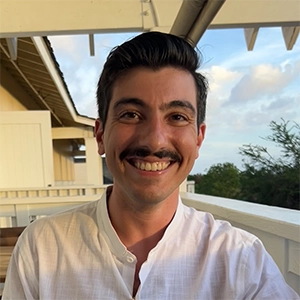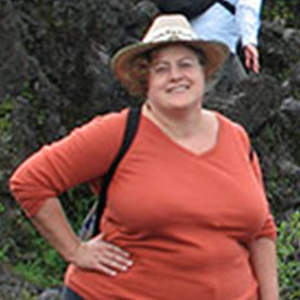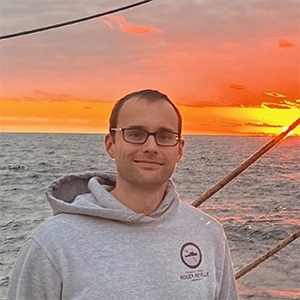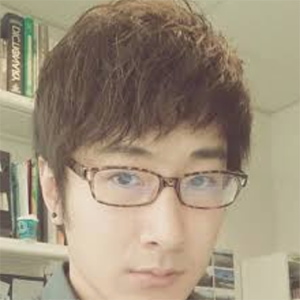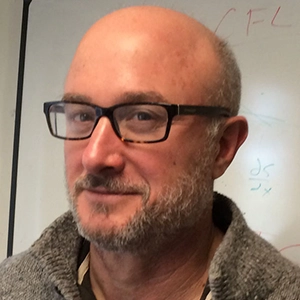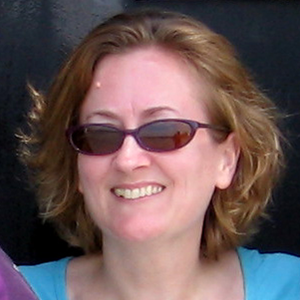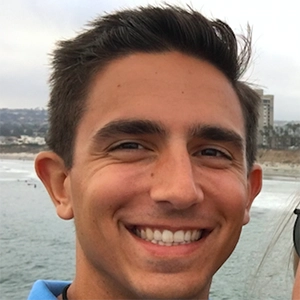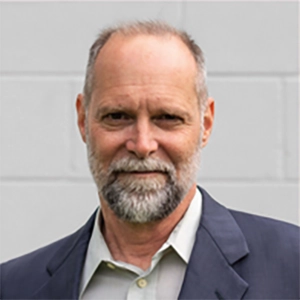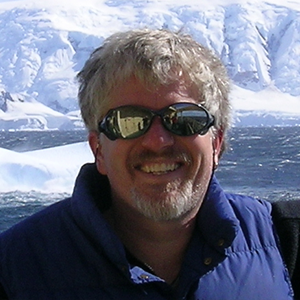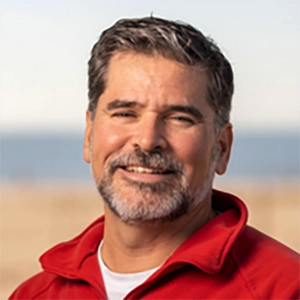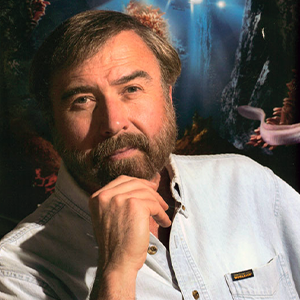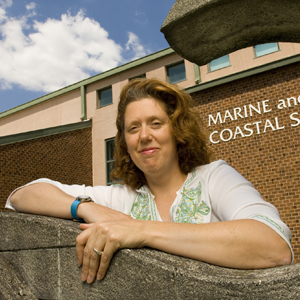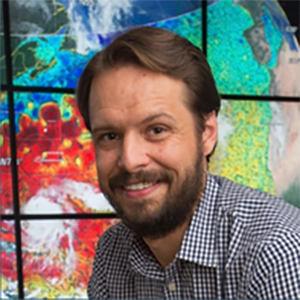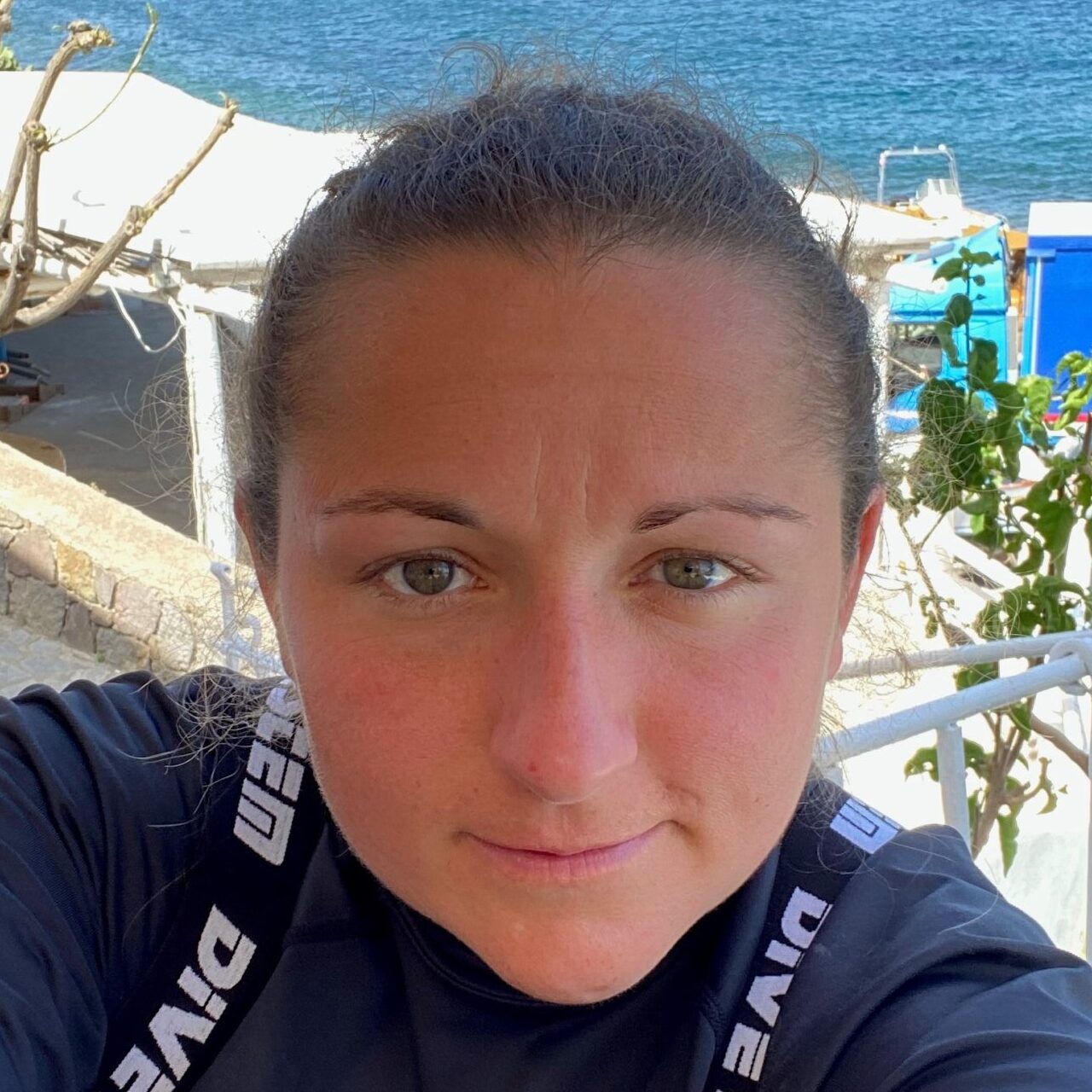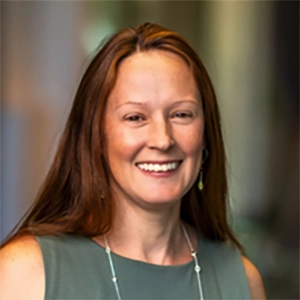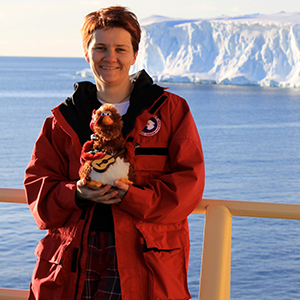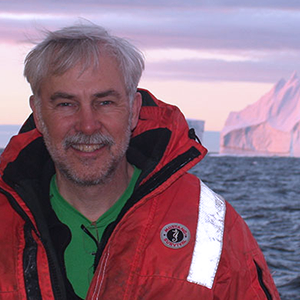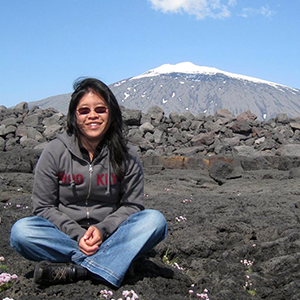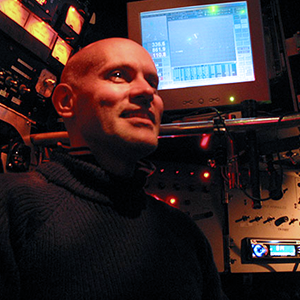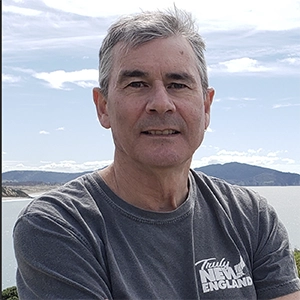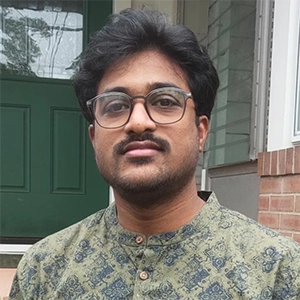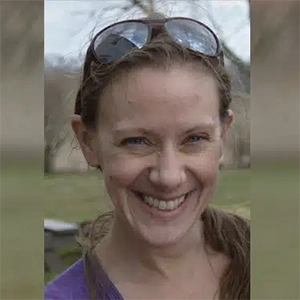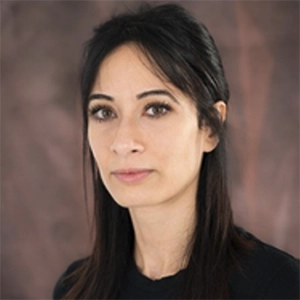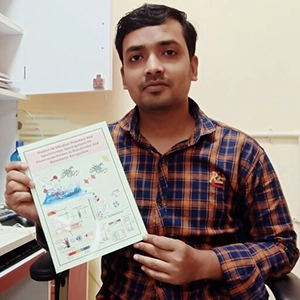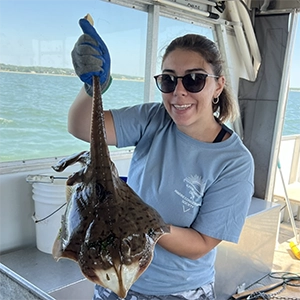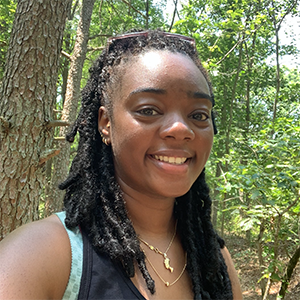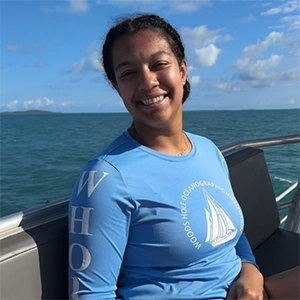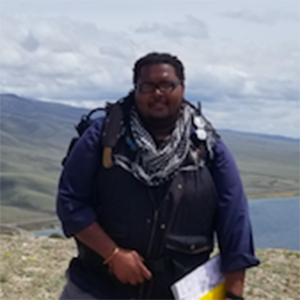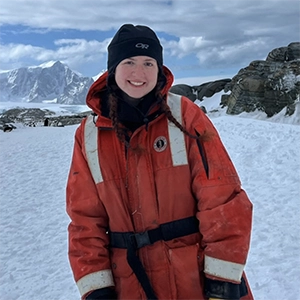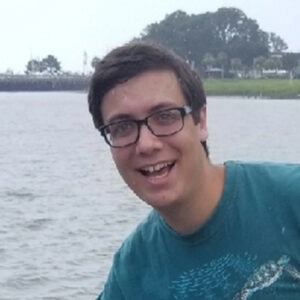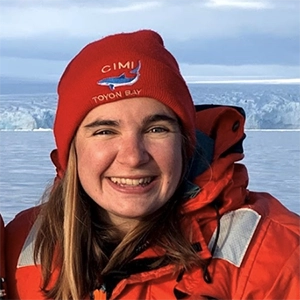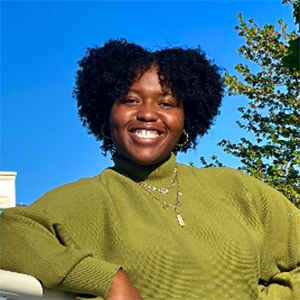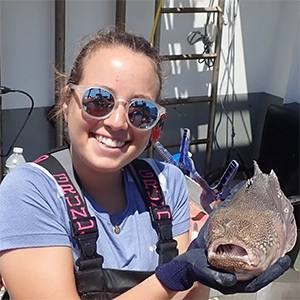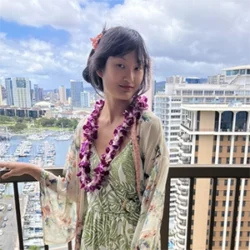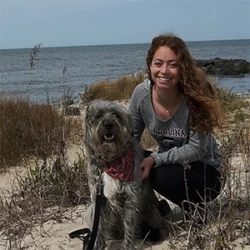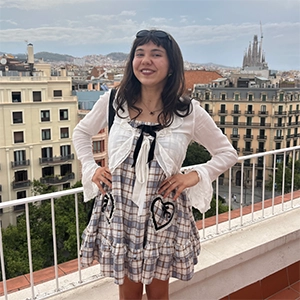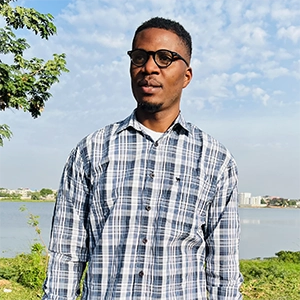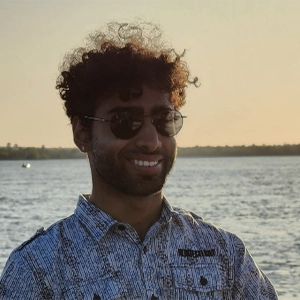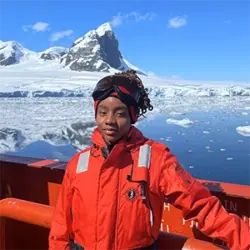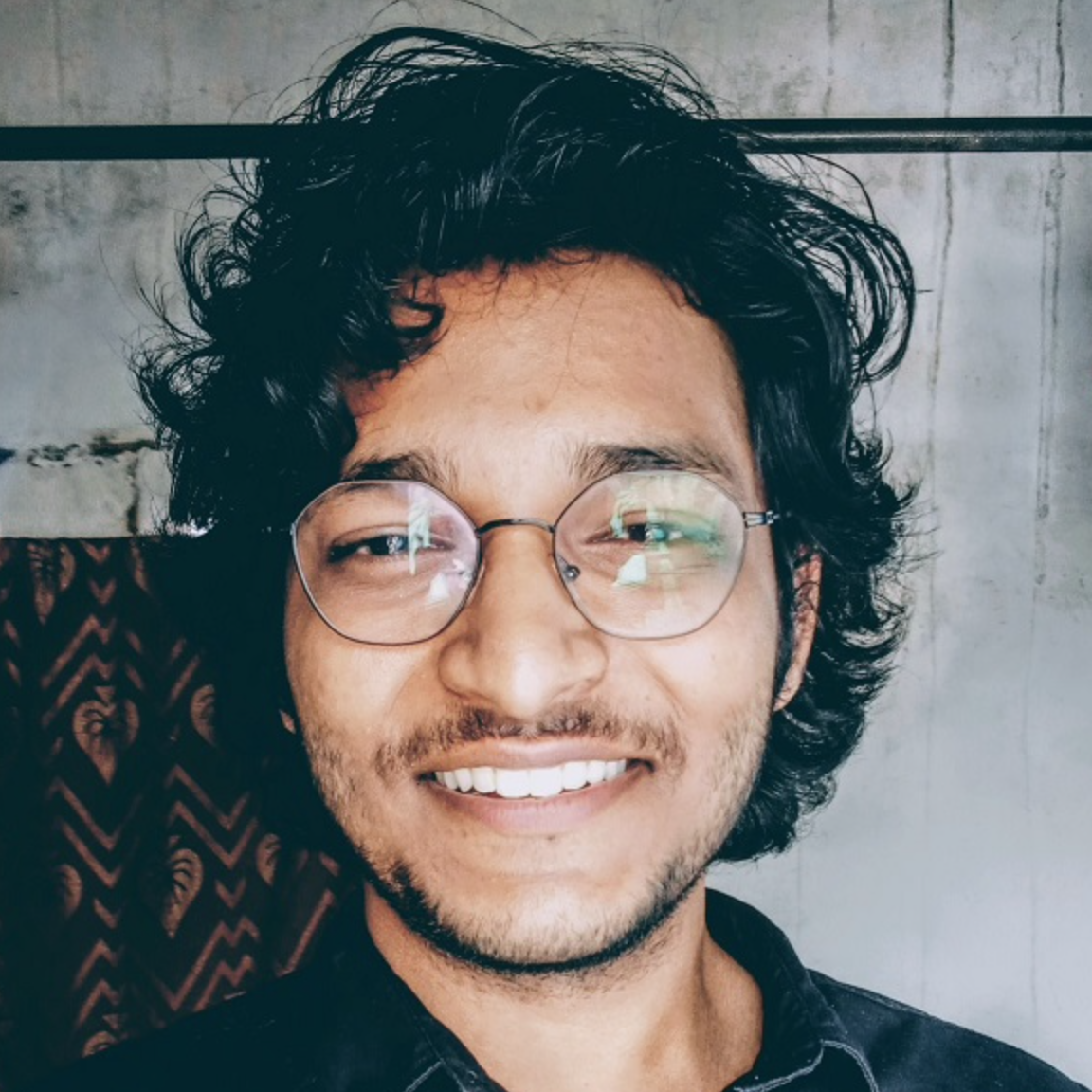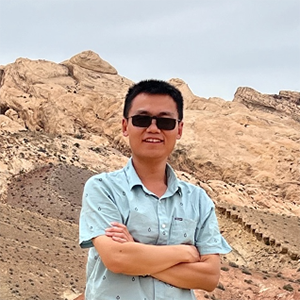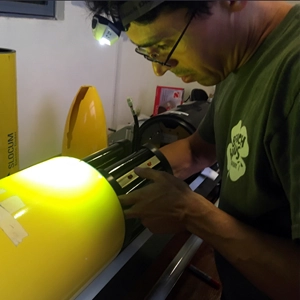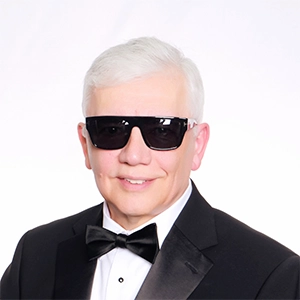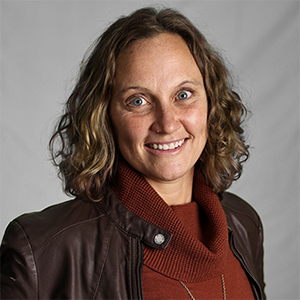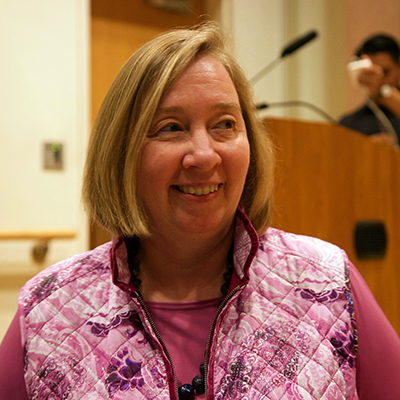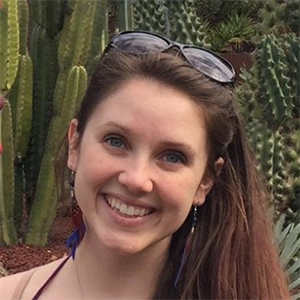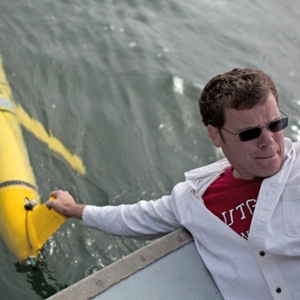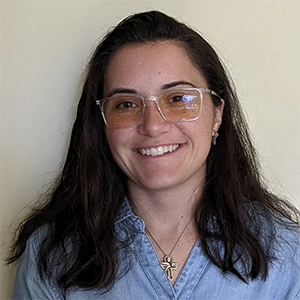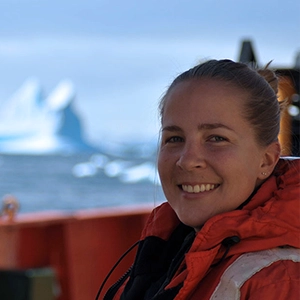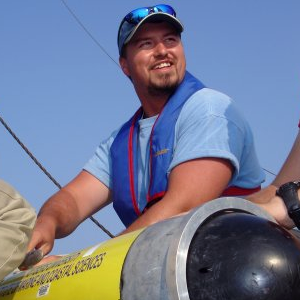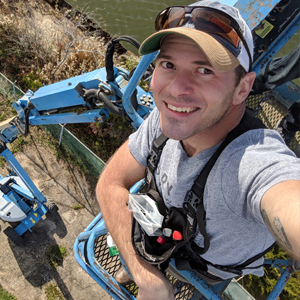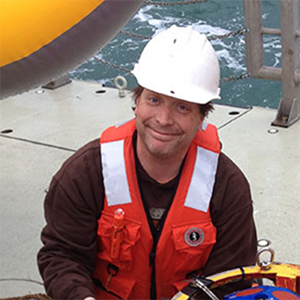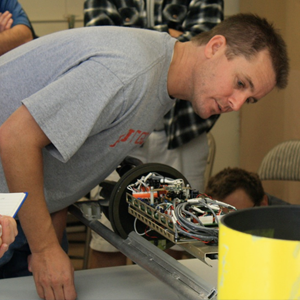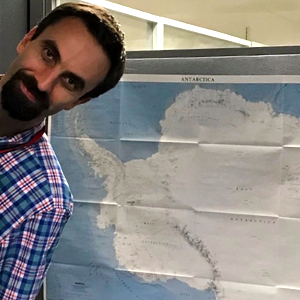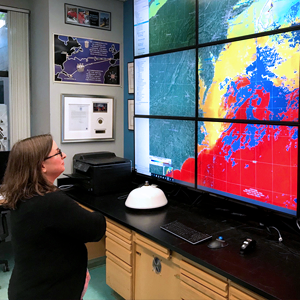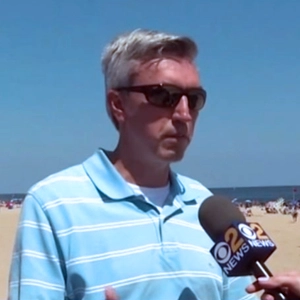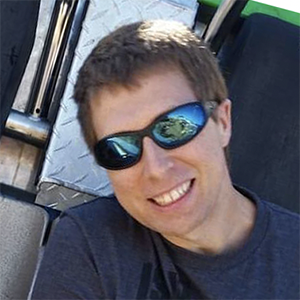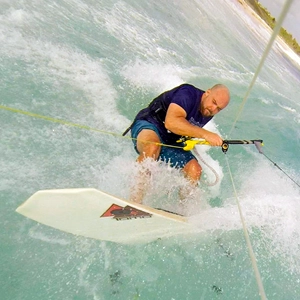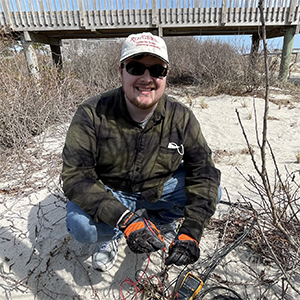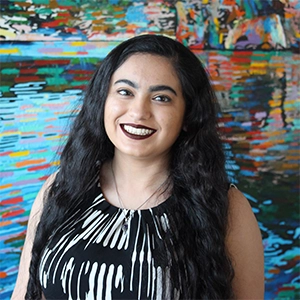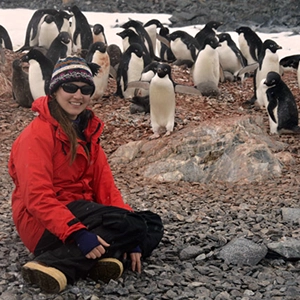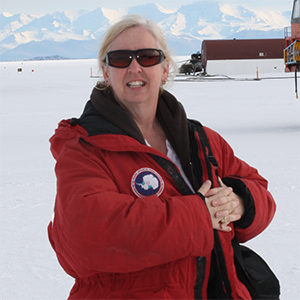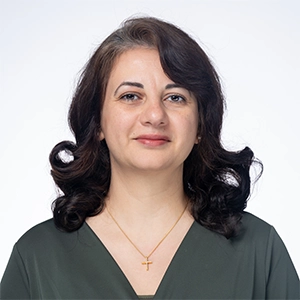Faculty
Michael Acquafredda
Downloads
Research Interests
Short History
Dr. Michael Acquafredda earned his BS in Biology from Tufts University in 2015 and his PhD in Ecology and Evolution from Rutgers University in 2021. His dissertation research was conducted at the Haskin Shellfish Research Laboratory and focused on expanding shellfish aquaculture through diversification and selective breeding. In 2020, he was awarded the Knauss Marine Policy Fellowship and worked at the National Ocean and Atmospheric Administration (NOAA) Ocean Acidification Program to advance domestic and international ocean acidification policy. After completing the Knauss fellowship and a postdoctoral research position with the NOAA Ocean Acidification Program, Dr. Acquafredda was awarded a postdoctoral research fellowship through the National Research Council. For this postdoc, Dr. Acquafredda conducted research on integrated multi-trophic aquaculture systems at the NOAA Northeast Fisheries Science Center. In 2023, Dr. Acquafredda returned to the Rutgers University Haskin Shellfish Research Laboratory as a research scientist. Today, Dr. Acquafredda continues to conduct aquaculture research, extension, and education work at Rutgers as an Assistant Extension Specialist in Aquaculture, where he serves as a bridge between the university and the aquaculture sector.
Teaching Efforts
Marine Invertebrates
Daniel Barone
Download
Short History
Dr. Barone is a jointly-appointed Associate Research Professor within the Rutgers University Department of Marine and Coastal Sciences (DMCS), Center for Advanced Infrastructure and Transportation (CAIT), and Department of Geography. He holds Bachelor’s and Master’s degrees in Marine Science and Instructional Technology from Stockton University and a PhD in Physical Geography from Rutgers University. Dr. Barone has over 15 years of experience addressing coastal resilience issues related to beach-dune storm vulnerability, maritime transportation, coastal floodplain mapping, and beneficial use of dredged material. He utilizes spatial data analysis, remote sensing, and coastal modeling techniques to solve complex coastal problems and present solutions to various audiences. Dr. Barone is also a Certified Floodplain Manager (CFM) and Geographic Information Systems Professional (GISP).
Courses
Karen Bemis
Downloads
Research Interests
K. Bemis’s research interests are primarily cross-disciplinary combining the development of new computer-based algorithms to view and understand geologic phenomena with the study of the phenomena. In particular, she seeks to quantify and illustrate changing geologic phenomena using computer visualization techniques, especially feature segmentation methods. Specific projects include the fluid dynamics of seafloor hydrothermal plumes, the growth of cinder (scoria) cone volcanoes, and the evolution of faults in 2D and 3D. Her research focuses on clarifying the controls on fluid flow and transport in geologic processes using both analytical and numerical methods. Results have been presented on particle sedimentation in seafloor hydrothermal plumes, the interaction of multiple plumes in a cross-flowing environment, and the connection between magma supply and volcanic growth. An interest in developing better visiospatial training techniques for the visualization skills needed in the geological sciences has grown out of the involvement of graduate and undergraduate students in her research. Important areas of focus include the capture if visualization properties that affect visualization comprehension and the creation of cognitive strategies to overcome these difficulties.
Kay Bidle
Downloads
Research Interests
Kay is a microbial oceanographer broadly defined. His research program focuses on microbial ecophysiology (especially eukaryotic phytoplankton), host-virus interactions/arms races, virology, molecular evolution and ecology, carbon flux biogeochemistry, and ecosystem processes. It merges physiology, biochemistry, and genome-enabled omics approaches to elucidate the molecular and cellular mechanisms that shape microbial interactions, their success in the oceans, and their influence on our natural world. Marine microbes (i.e., phytoplankton, bacteria, viruses) account for >95% of all oceanic biomass and their dynamic activities drive oceanic biogeochemical cycles. Yet, we are faced with fundamental open questions about their activity, molecular diversity, interactions, and evolution. Kay is particularly interested in how microbial arms races are regulated, especially those between algal hosts and viruses, and how specific classes of microbial genes influence microbial response to stress, ultimately influencing the ocean’s ecology and upper ocean biogeochemistry. It is the genetic imprint of marine microbes and their interaction with the environment and each other that shape how the ocean works and determine its response to environmental change. He has placed particular emphasis on host-virus interactions and how viruses impact carbon cycling, export and carbon sequestration. He currently leads a multi-institution NSF-funded Growing Convergence Research—one of NSF’s Top10 ideas—project blending biology, chemistry, physics, engineering, applied math and modeling to assess how viruses impact Earth’s carbon cycle and how prevailing ocean conditions exert fundamental controls on the predictive outcomes.
Short History
Kay received his B.S. in Biological Sciences and minor in Geography at the University of Maryland Baltimore County (UMBC) in 1991. After graduation, Kay worked at the Center of Marine Biotechnology (COMB) in Baltimore’s Inner Harbor as a Faculty Research Assistant before obtaining his PhD in Marine Biology from the Scripps Institution of Oceanography in La Jolla, California. There he examined the small-scale interactions between marine bacteria and diatoms and its mechanistic control on oceanic carbon cycling under the mentorship of Farooq Azam. Kay started at Rutgers as a Postdoctoral Fellow under Paul Falkowski and then joined the faculty in 2005. Over the course of his career, Kay has won several prestigious awards. These include the Raymond A. Lindeman Award from the Association of Limnology and Oceanography and Edward A. Frieman Award from Scripps for excellence in research. He was selected as a Marine Microbiology Initiative Investigator by the Gordon & Betty Moore Foundation—one of 16 international scientists to receive this award— and a Kavli Fellow from the US National Academy of Sciences. At Rutgers, Kay has been selected for a Board of Trustees Research Fellow for Scholarly Excellence, a Faculty Scholar-Teacher Award and a Research Excellence Award. Most recently, Kay was awarded the Outstanding Graduate in the Natural and Mathematical Sciences by UMBC’s Alumni Association.
Teaching Efforts
Undergraduate
Introduction to Oceanography (11:628:120:02/01:460:120:02)
Molecular Microbial Oceanography (11:628:404)
Advanced Technologies in Biosciences (11:126:444)
Guest Lectures in: Biological Oceanography: Water Column Ecosystems & Processes (16:712:520), Comparative Virology (11:126:407)
Graduate
Molecular Microbial Oceanography (16:712:525, 16:681:602, 16:215:603)
Biochemistry Seminar Course–Topics in Molecular & Cell Biology (16:695:611:01)
Guest Lectures in: Biological Oceanography: Water Column Ecosystems & Processes (16:712:520), Comparative Virology (11:126:407), First Year Seminar in Ecology and Evolution (16:215: 601); First Year Seminar in Microbial Biology (16:682:521); Microbial Life (16:682:501)
Outreach
I have worked hard to establish an impactful (and lasting) ‘Broader Impact Identity’ as a central to communicating my research and the importance of science in general to the broader community. Studies highlight a need to provide rich and robust opportunities for young people to access and participate in science both in and out of school, especially underrepresented groups and women, and to provide examples of varied STEM career paths. Allowing opportunities to engage and interact with data in multiple, authentic ways is an important component of STEM education for philosophical, pedagogical, and practical reasons. There is a particular need to bring the process of science, real-world datasets, models, and simulations into classrooms to inspire the next generation of scientists.
Using previous NSF-funded support, I created the ‘Tools of Science’ (ToS) (https://www.youtube.com/c/ToolsofScience), a series of educational videos and lesson plans designed to help learners explore the nature and process of science in the context of the Next Generation Science Standards (NGSS). It includes short, educational videos on: ‘Asking Testable Questions’, ‘Collaborations’, ‘Sampling’, ‘Modeling’, ‘Proxies’, ‘Data As A Tool’, and ‘Creativity’, as well as an ‘ENIGMA’ case study. We continue to develop the ToS platform to engage a broader group of students and educators by developing new NGSS-ready materials and evaluating their impact on our target audiences.
Select Publications
Johns, C.T., K.G.V. Bondoc-Naumovitz, A. Matthews, P.G. Matson, M.D. Iglesias-Rodriguez, A.R. Taylor, H.L. Fuchs and K.D. Bidle. 2023. Adsorptive exchange of coccolith biominerals facilitates viral infection. Sci. Adv. 9:eadc8728.
Locke, H., K.D. Bidle, K. Thamatrakoln, C. Johns, J.A. Bonachela, B.D. Ferrell, and K.E. Wommack. 2022. Virioplankton, the carbon cycle, and our future ocean. Adv. Virus Res. 114: 67-146
Diaz, B.P., B. Knowles, C.T. Johns, C.P. Laber, K.G.V. Bondoc, E.L. Harvey, D. Lowenstein, H. Fredricks, J.E. Hunter, L. Haramaty, F. Natale, J. Graff, N. Haentjens, N. Baetge, K. Mojica, P. Gaube, E. Boss, C. Carlson, M.J. Behrenfeld, B.A.S. Van Mooy, and K.D. Bidle. 2021. Seasonal mixed layer dynamics shape phytoplankton physiology, viral infection, and accumulation in the North Atlantic. Nature Comm. 12(1): 6634.
Knowles, B., J. Bonachela, M. Behrenfeld, K.G.V. Bondoc, B.B. Cael, C.A. Carlson, N. Cieslik, B. Diaz, H.L. Fuchs, J. Graff, J. Grasis, K. Halsey, L. Haramaty, C.T. Johns, F. Natale, J.I. Nissimov, B. Schieler, K. Thamatrakoln, T.F. Thingstad, S. Våge, C. Watkins, T. Westberry, and K.D. Bidle. 2020. Temperate infection in a canonically virulent host-virus system. Nature Comm. 11:4626.
Nissimov, J.I, D. Talmy, L. Haramaty, H. Fredricks, U. Zelzion, M. Eren, R. Vandzura, C. Laber, B. Schieler, C. Johns, K.D. More, M.J.L. Coolen, M.J. Follows, D. Bhattacharya, B.A.S. Van Mooy and K.D. Bidle. 2019. Biochemical diversity of glycosphingolipid biosynthesis as a driver of Coccolithovirus competitive ecology. Environ. Microbiol. 21(6):2182–2197
Johns, C.T., J.I. Nissimov, A. Grubb, F. Natale, V. Knapp, A. Mui, H. Fredricks, B.A.S. Van Mooy and K.D. Bidle. 2019. The mutual interplay between calcification and coccolithovirus infection. Environ. Microbiol. 21(6):1896–1915
Bidle, K.D. 2015. The molecular ecophysiology of programmed cell death in marine phytoplankton. Annu. Rev. Mar. Sci., 7: 341-375.
Laber, C.P., J.E. Hunter, A.F. Carvalho, J.R. Collins, E.J. Hunter, B. Schieler, E. Boss, K. More, M. Frada, K. Thamatrakoln, C.M. Brown, L. Haramaty, J. Ossolinski, H. Fredricks, J.I. Nissimov, R. Vandzura, U. Sheyn, Y. Lehahn, R.J. Chant, A.M. Martins, M.J.L. Coolen, A. Vardi, G.R. DiTullio, B.A.S. Van Mooy, and K.D. Bidle. 2018. Coccolithovirus facilitation of carbon export in the North Atlantic. Nature Microbiol. 3:537–547
Pasulka, A.L., K. Thamatrakoln, S.H. Kopf, Y. Guan, B. Poulos, A. Moradian, M.J. Sweredoski, S. Hess, M.B. Sullivan, K.D. Bidle, V.J. Orphan. 2018. Interrogating marine virus-host interactions and elemental transfer with BONCAT and nanoSIMS-based methods. Environ. Microbiol. 20(2):671-692
Bidle, K.D. 2016. Programmed cell death in unicellular phytoplankton. Curr. Biol. 26(13): R594–R607
Thamatrakoln, K., B. Bailleul, C.M. Brown, M.Y. Gorbunov, A.B. Kustka, M. Frada, P. Joliot, P.G. Falkowski and K.D. Bidle. 2013. Death-specific protein in a marine diatom regulates photosynthetic responses to iron and light availability. Proc. Natl. Acad. Sci. USA 10(50): 20123-20128.
Vardi, A., L. Haramaty, B.A.S. Van Mooy, H.F. Fredricks, S.A. Kimmance, A. Larsen, and K.D. Bidle. 2012. Host–virus dynamics and subcellular controls of cell fate in a natural coccolithophore population. Proc. Natl. Acad. Sci. USA 109(47): 19327-19332.
Bidle, K.D. and A. Vardi. A chemical arms race at sea mediates algal host–virus interactions. 2011. Curr. Opin. Microbiol. 14(4): 449-457.
Bidle, K.A., L. Haramaty, N. Baggett, J. Nannen, and K.D. Bidle. 2010. Tantalizing evidence for archaeal caspase-like protein expression and activity and its role in cellular stress response. Environ. Microbiol. 12(5): 1161-1172.
Vardi, A, B. Van Mooy, H.F. Fredricks, K.J. Popendorf, J.E. Ossolinski L. Haramaty, and K.D. Bidle. 2009. Viral glycosphingolipids induce lytic infection and cell death in marine phytoplankton. Science 326 (5954): 861-865.
Bidle, K.D., S. Lee, D.R. Marchant and P.G. Falkowski. 2007. Fossil genes and microbes in the oldest ice on Earth. Proc. Natl. Acad. Sci USA 104(33): 13455-13460.
Bidle, K.D., L. Haramaty, J. Barcelos-Ramos and P.G. Falkowski. 2007. Viral activation and recruitment of metacaspases in the unicellular coccolithophorid, Emiliania huxleyi. Proc. Natl. Acad. Sci. USA 104: 6049-6054.
Bidle, K.D. and P.G. Falkowski. 2004. Cell death in planktonic, photosynthetic microorganisms. Nature Reviews Microbiol. 2: 643-655.
Bidle, K.D., M. Manganelli and F. Azam. 2002. Regulation of diatom silicon and carbon preservation by temperature effects on bacterial activity. Science 298:1980-1984.
Bidle, K.D. and F. Azam. 1999. Accelerated dissolution of diatom silica by marine bacterial assemblages. Nature. 397:508-512.
Benedict Borer
Downloads
Research Interests
As a microbial biogeochemist, I am interested in how microorganisms control planetary biogeochemistry and modulate the impact of anthropogenic pollution. Research in the lab focuses on how microbes interact with each other and their environment, how they shape their localized biogeochemistry, and how they collectively impact biogeochemical cycles across scales in the Earth system. We combine computational (bioinformatics, computational fluid dynamics, individual-based modeling), wet lab (microfluidics, imaging, flow cytometry, analytical chemistry), and field-going approaches to gain a holistic and mechanism-based understanding of microbial ecosystems.
Short History
I obtained a Bachelor of Science degree in Environmental Systems Sciences from the Swiss Federal Institute of Technology (ETHZ) and a Master of Science in Hydrology from Imperial College London. I pursued a Ph.D. at the interface of Soil Physics and Environmental Microbiology back at the Swiss Federal Institute of Technology (ETHZ). Subsequently, I became a Swiss National Science Foundation postdoctoral research fellow at the Massachusetts Institute of Technology (MIT) in the group of Andrew Babbin studying the interactions between microbes and marine particles before joining the Department of Marine and Coastal Sciences as a tenure-track Assistant Professor at Rutgers University.
Kaixuan Bu
Downloads
Research Interests
Environmental geochemistry, ocean chemistry, paleoclimate and paleoceanography
Education
- PhD in Chemistry, University of Mississippi (2013)
- Master of Engineering , Applied Chemistry, Donghua University, China (2008)
- Bachelor of Engineering, Bioengineering at Donghua University, China (2005)
Teaching Efforts
16:712:514 Inductively Couples Plasma Spectroscopy Principles & Applications
Ryan has taken on the lead role in the Rutgers Inorganic Analytical Laboratory (RIAL) https://rial.marine.rutgers.edu/
where he is responsible for the maintenance and technical issues relating to the instruments and associated equipment, in order to keep the facility running efficiently and producing high-quality data.
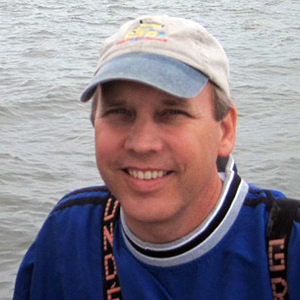
Professor | Director, Haskin Shellfish Research Laboratory
- bushek@hsrl.rutgers.edu
- 6959 Miller Avenue, Port Norris, New Jersey 08349
- https://hsrl.rutgers.edu/
David Bushek
Downloads
Research Interests
The predominant thrust of my research concerns host-parasite interactions in bivalve molluscs. A second focus aims to enhance our understanding of the ecological impact of bivalves, particularly the eastern oyster, at the population, community and ecosystem levels.
Short History
Dr. Bushek began his graduate training at the University of Houston where he developed an interest in marine ecology studying settlement and recruitment dynamics in the intertidal zone. After working a few years as a technician, he entered the doctoral program at Rutgers working on host-parasite interactions in molluscan shellfish. After earning his doctorate in 1994 he spent the next decade at the University of South Carolina as the Baruch Marine Field Laboratory’s Assistant Directory before returning to the Haskin Lab at Rutgers where he currently serves as Director.
Teaching Efforts
Undergraduate
Aquaculture
Oceanographic Methods & Data Analysis
Graduate
Selected Topics in Shellfish Ecology and Pathology
Select Publications
Ben-Horin, T., G. Bidegain, L. Huey, D.A. Narvaez, and D. Bushek (2015) Parasite transmission through particle feeding. J. Invert. Path. (in press)
Dungan, C.F. and D. Bushek. 2015. Development and applications of Ray’s fluid thioglycollate media for detection and manipulation of Perkinsus spp. pathogens of marine molluscs. J. Invert. Pathol. http://dx.doi.org/10.1016/j.jip.2015.05.004.
Bushek, D., S.E. Ford and I. Burt. 2012. Long-term patterns of an estuarine pathogen along a salinity gradient. J Marine Research, 70(2-3):225-251.
Ford, S.E. and D. Bushek. 2012. Development of resistance to an introduced marine pathogen by a native host. J. Marine Research, 70(2-3):205-223.
Ford, S.E., E. Scarpa and D. Bushek. 2012. Spatial and temporal variability of disease refuges in an estuary: implications for the development of resistance. J. Marine Research, 70(2-3):253-277.
Whalen, L., D. Kreeger, D. Bushek and J. Moody. 2012. Strategic Planning for Living Shorelines in the Delaware Estuary. National Wetlands Newsletter, 34(6):14-19.
Taylor, J. and D Bushek. 2008. Intertidal oyster reefs can persist and function in a temperate North American Atlantic estuary. Mar. Ecol. Prog. Ser. 361:301-306.
Dame, R., D. Bushek, D. Allen, A. Lewitus, D. Edwards, E. Koepfler and L. Gregory. 2002. Ecosystem response to bivalve density reduction: management implications. Aquatic Ecology, 36:51-65.
Bushek, D. and S.K. Allen, Jr. 1996. Host-parasite interactions among broadly distributed populations of the eastern oyster Crassostrea virginica and the protozoan Perkinsus marinus. Mar. Ecol. Prog. Ser. 139:127-141.
Robert Chant
Downloads
Research Interests
My main research focus is on the physics of estuarine and coastal systems. Specifically, my research utilizes observations, theory and modeling to advance our understanding of processes that control stratification, vertical mixing and dispersion because they are central in defining the physical and biogeochemical function of these environments. My interests and activities include both basic studies of the physics of these systems as well as addressing applied problems such as sediment and contaminant transport, effects of basin engineering on circulation and mixing and more recently how climate change and water shed activities may influence these systems in the future.
Short History
Grew up on Long Island’s south shore where I informally explored marine science as a amature sailor and professional clam digger. Earned an undergraduate degree in Electrical Engineering from SUNY Buffalo in 1985 and a PhD in Oceanography from SUNY Stony Brook in 1995. Began at Rutgers University as a Post-doctoral fellow in 1995 and where I am now a Professor in the Marine and Coastal Science Department.
Teaching Efforts
Undergraduate
Humans Interacting with the Coastal Ocean
Introduction to Physical Oceanography
Exploring New Jersey’s Water Ways (Byrne Seminar)
Geophysical Data Analysis
Graduate
Introduction to Physical Oceanography
Geophysical Data Analysis
Coastal and Estuarine Ocean Dynamics
Select Publications
Aristizábal, María, Robert Chant, 2013: A Numerical Study of Salt Fluxes in Delaware Bay Estuary. J. Phys. Oceanogr., 43, 1572–1588
Jurisa, JT, RJ Chant, 2013, Impact of offshore winds on a buoyant river plume system. Submitted to the Journal of Physical Oceanography, 43:2571:2587, DOI: 10.1175/JPO-D-12-0118.1
Chant. R.J D. Fugate and E Garvey, 2011, “The role of evolving dynamics and geomorphology in shaping an estuarine superfund site” Estuaries and Coasts 34: 90-105, DOI: 10.1007/s12237-010-9324-z
Chant R J, 2010, Estuarine Secondary Circulation. In Contemporary topics in estuarine physics and water quality. Cambridge University Press.
Chant, R. J., S. M. Glenn, E. Hunter, J. Kohut, R. F. Chen, R. W. Houghton, J. Bosch, and O. Schofield (2008), Bulge Formation of a Buoyant River Outflow, J. Geophys. Res., doi:10.1029/2007JC004100
Chant, R.J., W.R. Geyer, R.H Houghton, E. Hunter and J. Lerzcak (2007) “Estuarine boundary layer mixing processes: insights from dye experiments” Journal of Physical Oceanography Vol. 37 No 7 1859-1877
Chant, R. J. 2002. Secondary flows in a region of flow curvature: relationship with tidal forcing and river discharge. Journal of Geophysical Research. 10.1029/2001JC001082, 21 September.
Paul Falkowski
Downloads
Bennett L. Smith Chair in Business and Natural Resources
Departments of Earth and Planetary Sciences and Marine and Coastal Sciences
Board of Governors Professor and Founding Director of the Rutgers Energy Institute
Research Interests
My research interests are focused on three areas – origins of life, how electron transfer reactions are mediated, and how organisms transformed the geochemistry of Earth. In the evolution of Earth, microbes became a major force in transforming this planet to make it habitable for animals, including humans. I seek to understand the basic chemical reactions that enabled microbes to transform Earth’s geochemistry. I work at the molecular level of proteins and fundamental chemical reactions of minerals, and the global scale of how this planet came to have oxygen as the second most abundant gas. I am most interested in understanding how these kinds of processes have transformed our planet and may evolve on planetary bodies in our solar system and on extra-solar planets. There are only two questions I address: Where did we come from? And are we alone?
Short History
After graduating from the University of British Columbia and doing a 9 month post-doc at the University of Rhode Island, I was hired at the Brookhaven National Laboratory as staff scientist in the newly formed Oceanographic and Atmospheric Sciences Division. I worked there for 23 years and developed the field of environmental biophysics. In 1998 I moved my research group to Rutgers University. In 2007 I was elected to the National Academy of Science for my research on the global carbon cycle.
Teaching Efforts
History of Earth Systems 11:628:476:01 (Marine and Coastal Sciences – Undergrad.)
16:712:560:01 (Oceanography-Grad.)
Heidi Fuchs
Downloads
Research Interests
My research focuses on three main themes: 1) mechanistic interactions between planktonic invertebrate larvae and small-scale physics, 2) impacts of small-scale biophysical interactions on large-scale movements and settlement patterns, and 3) predator-prey interactions and their effects on planktonic ecosystem dynamics. These problems are fundamentally interdisciplinary, and my work integrates empirical and theoretical approaches from fluid mechanics, physical oceanography, and quantitative marine ecology.
Short History
2005 PhD, MIT & Woods Hole Oceanographic Institution, Biological Oceanography
1999 BS, University of Wyoming, Zoology
1990 BS, University of Wisconsin – Madison, Art
Teaching Efforts
Undergraduate/Graduate
Dynamics of Marine Ecosystems
Biophysical Interactions
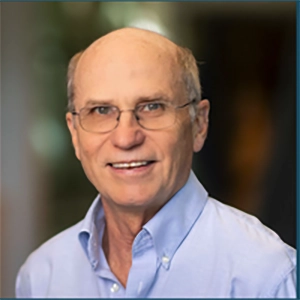
Distinguished Professor | Co-Director of the Center of Ocean Observing Leadership
Scott Glenn
Downloads
Full CV | 4 Page CV | Press Kit
Research Interests
My research interests include the development of new autonomous ocean observing technologies, their application to scientific research in remote and extreme environments, and the demonstration of new educational paradigms. My technology development work focuses on autonomous systems that can be operated remotely as distributed networks to improve the spatial sampling of complex environments. A major scientific focus is extreme events, including storms, hurricanes and typhoons, investigating with observations and numerical models the linkages between the ocean, the atmosphere above, and the seabed below. My educational activities are designed to better prepare students to meet the challenges of a changing environment using modern observatories to explore the global ocean.
Short History
After graduating from the Massachusetts Institute of Technology and Woods Hole Oceanographic Institution Joint Program in 1983 with a Sc.D. in Ocean Engineering, I began an over 30-year research career of implementing sustained real-time ocean observation and forecast systems first for offshore oil exploration at Shell Development Company (1983-1986), then for the Naval Oceanography Command supporting fleet operations while at Harvard University (1986-1990), and, since 1990, for a wide range of scientific and societal applications at Rutgers University. In the only U.S. national program to recognize excellence in undergraduate teaching, I was named one of the U.S. Professors of the Year representing the State of New Jersey by the Carnegie Foundation for the Advancement of Teaching and the Council for Advancement and Support of Education.
Teaching Efforts
Dynamics of Waves, Currents and Sediment Transport (Oceanography – Grad)
Ocean Observatories Research Course (Marine and Coastal Sciences – Undergrad)
Oceanography House (Marine and Coastal Sciences – Undergrad)
Ocean Methods and Data Analysis (Marine and Coastal Sciences – Undergrad)
Max Gorbunov
Downloads
Research Interest
Biological oceanography, coral reefs, biophysics and physiology of photosynthesis, photoreceptors, benthic ecosystems, ocean optics, relationship between physical and biological processes in the ocean, global biogeochemical cycles, remote sensing.
Joseph Gradone
Downloads
Research Interests
While I consider myself a physical oceanographer, I also consider myself a sort of “jack of all trades” rather than a “master of one”. Broadly, I am interested in utilizing my background in industry, science, and engineering to leverage and develop different ocean-observing technologies to solve problems of practical and societal importance. At the highest level, my research centers on understanding how the ocean transports important tracers (heat, salt, nutrients, etc.). I am fundamentally interested in how global warming may change ocean circulation, thereby impacting the transport of these tracers and the feedbacks that connect these processes. My present research is focused on understanding the processes mixing climatically important water masses in the Caribbean Through-Flow using Slocum gliders and targeted modeling experiments. This work is part of a National Science Foundation (NSF) project that I am a Co-PI on along with Travis Miles (Rutgers), Ruoying He (NS State), and Doug Wilson (UVI).
Short History
While I grew up in New Jersey, only 10 miles from campus, I have zig-zagged throughout the US for schooling, research experiences, and jobs. I received my Bachelor of Science degree in Geology from the University of Colorado Boulder in 2016 and my Master of Science degree in Oceanography from the University of Delaware under the direction of Dr. Matthew Oliver in 2018. My master’s research investigated the impacts of sea surface kinetic energy on phytoplankton blooms in the Southern Ocean through the use of remote sensing, ocean models, and biogeochemical Argo floats. From 2018 to 2020, I worked for Teledyne Webb Research on Cape Cod as a Slocum glider Customer Support Applications Engineer. From 2020 to 2024, I completed my PhD studying the circulation dynamics of the Caribbean Through-Flow under the supervision of Dr. Travis Miles. For my PhD research, I used a combination of Slocum gliders and ocean reanalysis output to investigate the volumetric transport and transformation of climatically important water masses that comprise the upper-limb of the Atlantic Meridional Overturning Circulation (AMOC) flowing through the Caribbean.
Thomas Grothues
Downloads
Research Interests
I am interested in the abundance and distribution of fishes as responses to physical factors. These responses include those that could be considered involuntary, such as distribution of larvae by ocean currents and mortality or loss of reproductive capacity in unsuitable environments. Responses also include those that are voluntary (behavioral), such as migration, ranging, and sheltering (including burial). The physical factors that I investigate as impacts include natural and anthropogenic perturbations such as restoration efforts, urbanization of water fronts, seasonal and inter-annual water quality fluctuations and ocean structure. In the last 10 years I have worked extensively with adult and juvenile stages on movement, migration, and habitat choice. In doing so, I developed an interest in furthering technologies and strategies to meet the challenges of studying highly mobile fish in the ocean, including sablefish and salmon in deep Alaskan waters, sturgeon, flounder, and other sport fishes along the East and Gulf coasts of the US, and pelagic thresher sharks in the Visayan Sea, Philipinnes. The development of tools such as payload-controlled autonomous underwater vehicles for fish tracking and imaging, and related processing algorithms for sonar image classification and decision making, can be revealing but require understanding of natural history and behavior in order to be effective in implementation. These investigations are therefore truly cross-disciplinary and involve collaborations with other biologists, physical and geological oceanographers, commercial fishers, and mechanical, electrical, computer, and acoustical engineers, as well as interaction with Federal, State, municipal, and private-sector resource managers.
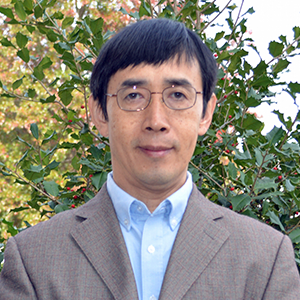
Distinguished Professor
- xguo@hsrl.rutgers.edu
- 6959 Miller Avenue, Port Norris, New Jersey 08349
- https://hsrl.rutgers.edu/
Ximing Guo
Downloads
Research Interests
My research is on genetics, evolutionary biology and aquaculture of molluscs. I am interested in genetic mechanisms of molluscan development and adaption, and their applications in the improvement of cultured molluscs. Research in my lab may include basic studies towards a better understanding of molluscan biology and evolution, including studies on how genomic changes, meiosis and sex affect fitness and environmental adaptation. I also conduct applied research on genetic improvement of cultured molluscs as molluscan aquaculture plays an important role in sustainable seafood production. Applied research may include genetic analyses of economically important traits such as growth and disease resistance, and the development of new technologies for improving cultured molluscs through polyploidization and genomic selection.
Short History
Ximing Guo received his Ph.D. from University of Washington (Seattle). He joined the Haskin Shellfish Research Laboratory as a Postdoctoral Research Associate in 1992 and became a Research Assistant Professor in 1995. He was promoted to Associate Professor in 2001, Full Professor in 2007 and Distinguished Professor in 2019. Ximing is an Honored Life Member of the National Shellfisheries Association (USA). He has been directing the Shellfish Genetics and Breeding Program at Rutgers since 1998.
Teaching Efforts
Aquaculture, 11:628:317
Select Publications
Guo, X., J.B. Puritz, Z. Wang, D. Proestou, S. Allen Jr., J. Small, K. Verbyla, H. Zhao, J. Haggard, N. Chriss, D. Zeng, K. Lundgren, B. Allam, D. Bushek, M. Gomez-Chiarri, M. Hare, C. Hollenbeck, J. La Peyre, M. Liu, K. E. Lotterhos, L. Plough, P. Rawson, S. Rikard, E. Saillant, R. Varney, G. Wikfors, and A. Wilbur. 2023. Development and evaluation of high-density SNP arrays for the eastern oyster Crassostrea virginica. Marine Biotechnology, 25:174-191. https://doi.org/10.1007/s10126-022-10191-3
Li, Y., K. M. Slavik, H. C. Toyoda, B. R. Morehouse, C. C. de Oliveira Mann, A. Elek, S. Levy, Z. Wang, K. S. Mears, J. Liu, D. Kashin, X. Guo, T. Mass, A. Sebé-Pedrós, F. Schwede & P. J. Kranzusch. 2023. cGLRs are a diverse family of pattern recognition receptors in innate immunity. Cell 186:3261-3276.e3220. https://doi.org/10.1016/j.cell.2023.05.038
Zeng, D., Guo, X. 2022. Mantle transcriptome provides insights into biomineralization and growth regulation in the eastern oyster (Crassostrea virginica). Marine Biotechnology, 24:82-96. https://doi.org/10.1007/s10126-021-10088-7
Guo, X., C. Li and H. Wang. 2018. Diversity and evolution of living oysters. J. Shellfish Res., 37(4):755-771. https://doi.org/10.2983/035.037.0407
Guo, X., and S.E. Ford. 2016. Infectious diseases of marine molluscs and host responses as revealed by genomic tools. Phil. Trans. R. Soc. Lond. B, 371: 20150206. http://dx.doi.org/10.1098/rstb.2015.0206
Guo, X., Y. He, L. Zhang, C. Lelong and A. Jouaux. 2015. Immune and stress responses in oysters with insights on adaptation. Fish & Shellfish Immunology, 46:107-119. http://dx.doi.org/10.1016/j.fsi.2015.05.018
Zhang, N., F. Xu & X. Guo. 2014. Genomic analysis of the Pacific oyster (Crassostrea gigas) reveals possible conservation of vertebrate sex determination in a Mollusc. G3: Genes| Genomes| Genetics, 4:2207-2217. https://doi.org/10.1534/g3.114.013904
Zhang, G., X. Fang, X. Guo, L. Li, R. Luo, F. Xu, et al (80). 2012. The oyster genome reveals stress adaptation and complexity of shell formation. Nature, 490:49-54. (http://dx.doi.org/10.1038/nature11413)
He, Y., H. Yu, Z. Bao, Q. Zhang and X. Guo. 2012. Mutation in promoter region of a serine protease inhibitor confers Perkinsus marinus resistance in the eastern oyster (Crassostrea virginica). Fish & Shellfish Immunology 33: 411-417.
Guo, X., Y. Wang, Z. Xu and H. Yang. 2009. Chromosome set manipulation in shellfish. Pp 165 – 195 in: New Technologies in Aquaculture: Improving Production Efficiency, Quality and Environmental management, G. Burnell and G. Allan (eds). Woodhead Publishing.
Tanguy, A., X. Guo and S.E. Ford. 2004. Discovery of genes expressed in response to Perkinsus marinus challenge in eastern (Crassostrea virginica) and Pacific (C. gigas) oysters. Gene, 338:121-131.
Guo, X., D. Hedgecock, W.K. Hershberger, K. Cooper and S.K. Allen, Jr. 1998. Genetic determinants of protandric sex in Crassostrea oyster. Evolution, 52(2):394-402.
Guo, X., G. DeBrosse and S.K. Allen, Jr. 1996. All-triploid Pacific oysters (Crassostrea gigas Thunberg) produced by mating tetraploids and diploids. Aquaculture, 142:149-161.
Lee Kerkhof
Downloads
Research Interests
The purpose of my research is to elucidate the active microbes in a variety of complex environments, and to understand the mechanisms driving microbial diversity and biogeochemical processes. Specifically, I use nucleic acid based analyses to identify those microorganisms (prokaryotic, archaeal, and eukaryotic) that are making ribosomes or incorporating C and N into their genomes. These microbes are by definition “active” and are controlling the biogeochemistry of the habitats in which they are found. These research efforts have focused on active bacteria in aeolian systems, in aquatic systems, in association with eukaryotic hosts, and in sediments/soils. Additionally, our research spans a continuum from studies of pure cultures, to engineered systems, to field measurements. I believe that understanding the biological forces shaping microbial communities and their activity will lead to better predictions regarding the biogeochemical processes that sustain life on this planet.
Short History
Lee Kerkhof received his Ph.D. from the Univ. of CA, San Diego/Scripps Institution of Oceanography in 1991. He had post-doctoral experience at the Univ. of CA/Irvine, the Agouron Institute, and Brookhaven National Laboratory before arriving at Rutgers in 1994. Dr. Kerkhof has been at Rutgers for over 20 years and is currently a Professor in the Department of Marine and Coastal Sciences.
Teaching Efforts
Microbial Life (16:681:501) Graduate survey course on the breadth of microbial life and diversity in terrestrial and aquatic environments. Emphasis is placed on the ecological role microbes play in habitats ranging from microbial mats to the human body.
Ocean Ecology (11:628:462) and Biological Oceanography(16:712:522) Undergrad/Grad lecture course focused on understanding the interactions of marine organisms with each other and with the physical, chemical, and geological properties of the ocean.
Introduction to Oceanography (11:628:120) Undergrad lecture course introducing non-major students to the essential aspects of oceanography, including geological, physical, chemical, and biological processes.
Readings/exercises have students learn how ocean systems work, how marine systems are studied, how the ocean influences Earth’s biosphere and atmosphere, how the oceans support living ecosystems, and which issues are of concern for the fate of oceans and their coastlines.
Josh Kohut
Downloads
Research Interests
Physical processes in the coastal ocean are highly variable in space and time and play a critical role in coupled biological and chemical processes. From events lasting several hours to days on through inter-annual and decadal scales, the variability in the fluid itself structures marine ecological systems. My approach is to apply ocean observing technologies that now sample across these important time and space scales to better understand the physical ocean that structures marine ecosystems. I am involved in many research and education programs that range in scope from storm intensity, offshore wind, and local water quality monitoring off the NJ coast; regional fisheries along the US east coast; and environmental studies of polar ecosystems in the coastal waters surrounding Antarctica. Consequently, this new knowledge has relevancy to broader stakeholder communities with interests in the coastal ocean. Working through partnerships across these stakeholder groups, my research is collaborative and supports both science and application. Through these partnerships I am able to frame relevant scientific hypotheses and efficiently translate the output to better management and monitoring.
Short History
Growing up in New Jersey, my interest in the physics of the ocean began along the shores of Barnegat Bay. After receiving my Bachelor’s degree in Physics at the College of Charleston in Charleston, SC, I returned to New Jersey and began my research career at Rutgers. Now I look forward to addressing new science and, working through partnerships, translating that science into applications that benefit the many stakeholders with interests in the coastal ocean.
Julia Levin
Downloads
Research Interests
Regional and multi-scale ocean modeling, data assimilation and observing system design, real-time ocean forecasting
Education
- PhD(App.Math), Columbia University, 1995;
- MS, Columbia University, 1992;
- BS(App.Math), Moscow Oil and Gas Academy, 1988.
Select Publications
- J.Levin, H.Arango, B.Laughlin, E.Hunter, J.Wilkin, A.Moore,”Observation impacts on the Mid-Atlantic Bight front and cross-shelf transport in 4D-Var ocean state estimates: Part II – The Pioneer Array”, Ocean Modelling, 157, 2021, 101731
- J.Levin, H.Arango, B.Laughlin, E.Hunter, J.Wilkin, A.Moore,”Observation impacts on the Mid-Atlantic Bight front and cross-shelf transport in 4D-Var ocean state estimates: Part I – Multiplatform analysis”, Ocean Modelling, 156, 2020, 101721
- A. Lopez, J.Wilkin, J. Levin, “Doppio – a ROMS (v3.6)-based circulation model for the Mid-Atlantic Bight and Gulf of Maine: configuration and comparison to integrated coastal observing network observations”, Geosci. Model Dev., 13, 2020, 3709-3729
- J. Levin, H. G. Arango, B. Laughlin, J. Wilkin, and A.Moore,”The impact of remote sensing observations on cross-shelf transport estimates from 4D-Var analyses of the Mid-Atlantic Bight”, Advances in Space Research, 2019, in press
- J. Wilkin, J. Levin, A. Lopez, E. Hunter, J. Zavala-Garay, and H. Arango, A coastal ocean forecast system for the U.S. Mid-Atlantic Bight and Gulf of Maine, In New Frontiers in Operational Oceanography, Proceedings of the GODAE OceanView International School 2017, E. Chassignet, A. Pascual, J. Tintore and J. Verron (Eds.), Springer, New York, 2018, 593-623
- J. Levin, J. Wilkin, N. Fleming and J. Zavala-Garay, “Mean circulation of the Mid-Atlantic Bight from a climatological data assimilative model”, Ocean Modelling, 128, 2018, 1-14
- W.G. Zhang, J.L. Wilkin, J.C. Levin , “Towards an integrated observation and modeling system in the New York Bight using variational methods, Part II: Representer-based observing system design”, Ocean Modelling, 35(3), 2010, 134-145
- W.G. Zhang, J.L. Wilkin, J.C. Levin , H.G. Arango, “An Adjoint Sensitivity Study of Bouyancy- and Wind-driven Circulation on the New Jersey Inner Shelf”, Journal of Physical Oceanography, 39(7), 2009, 1652-1668
- J. Levin, M. Iskandarani, D.B. Haidvogel “To Continue or Discontinue: Comparisons of Continuous and Discontinuous Galerkin Formulations in a Spectral Element Ocean Model, Ocean Modeling, 15, 2006, 56-70
- J. Levin, D.B. Haidvogel, B. Chua, A.F.Bennett, M. Iskandarani “Euler-Lagrange Equations for the Spectral Element Shallow Water System”, Ocean Modeling, 12, 2006, 348-377

Assistant Teaching Professor | Master of Operational Oceanography (MOO) Degree Program Director
Alex Lopez
Downloads
Research/Teaching Interests
My research interests include applications of regional ocean models to transport pathways and timescales, as well as simulating regional microplastic particle fate. My teaching interests include developing students into skilled researchers that exemplify lifelong learners, through critical thinking engagement, practical learning experiences, and presentation opportunities.
Short History
I received my B.S. in Physics from The College of New Jersey in 2010, then a Master of Arts in Teaching in 2011, also from The College of New Jersey. I received my Ph.D. from Rutgers, The State University of New Jersey in 2020, studying circulation timescales and transport pathways of the Mid-Atlantic Bight and Gulf of Maine using ROMS. I was a postdoctoral scholar at Pennsylvania State University, studying microplastic particle fate within Chesapeake Bay using modeling.
Teaching Efforts
16:712:505 Integrated Ocean Observing 1
16:712:506 Integrated Ocean Observing 2
16:712:507 Field Laboratory Methods 1
16:712:508 Field Laboratory Methods 2
16:712:509 Integrated Ocean Observing – Software Bootcamp
16:712:510 Operational Ocean Modeling & Data Visualization
Richard Lutz
Downloads
Research Interests
Ecology of Deep-Sea Hydrothermal Vents; Discovery of Marine Natural Products; Larval Ecology of Marine Invertebrates; Molluscan Shell Structure and Mineralogy; Marine Fisheries and Aquaculture
Short History
Richard A. Lutz received his B.A. from the University of Virginia in 1971, his Ph.D. from the University of Maine in 1975 and subsequently spent several years as a postdoctoral fellow at Yale University. In 1979, he joined the faculty of Rutgers University, where he currently is a Distinguished Professor in the Department of Marine & Coastal Sciences and Director of the Rutgers Center for Deep-Sea Ecology and Biotechnology. He served as Chairman of the Planning and Search Committee for Rutgers Institute of Marine and Coastal Sciences (IMCS), which was created in 1987, and was Director of IMCS from 2011 until 2014, at which time IMCS was transformed into Rutgers new Institute of Earth, Ocean and Atmospheric Sciences.
Teaching Efforts
Biology and Geology of Deep-Sea Hydrothermal Vents
Janice McDonnell
Downloads
Two Page CV | 4-H Science | Polar Ice
Research Interests
Janice is currently serving as the Science Engineering & Technology Agent for the department of 4-H Youth Development at Rutgers University where she supports county 4-H Agents in promoting STEM in their communities. She hosts a variety of on-campus programs designed to engage young people in Rutgers University science and engineering programs. In addition, Janice helps university faculty to develop innovative and effective broader impact statements in accordance with NSF’s Criterion II. Scientists and Engineers are engaged in a wide variety of education and outreach initiatives designed to educate the public about STEM disciplines. Janice works with scientists to translate their research into educational products that can be used by K-16 students, teachers and the general public. Finally, Janice is interested in program evaluation and works with a range of external collaborators to conduct a range of program assessments.
Short History
Janice served as the Director for the National Science Foundation’s Centers for Ocean Science Education Excellence Networked Ocean World (COSEE- NOW) 2002-2012, where the goal is to help scientists and educators work together to better understand and educate others about the ocean. Together with her colleagues and collaborators, she has developed a range of tools and professional development programs for both educators and scientists that help promote Ocean Literacy. More recently, Janice has been working on undergraduate education and promoting diversity in the ocean sciences.
Travis Miles
Downloads
Research Interests
I am a physical oceanographer interested in understanding how the atmosphere, cryosphere, earth, and ecosystems connect through the ocean across a broad range of temporal and spatial scales. To understand these connections I use and develop ocean observation networks that sample across spatial and temporal scales in combination with process oriented numerical modeling. I am involved with an array of multi-disciplinary projects that involve: 1) Rapid response Teledyne-Webb Slocum glider deployments ahead of coastal storms; 2) investigation of the ice-ocean interactions in the Amundsen Sea and 3) development of novel satellite products in support of wind resource estimates for coastal New Jersey.
Short History
I received my B.S. in Marine science and Meteorology from North Carolina State University (NCSU) in 2007. In 2009 I completed a Master’s in Physical Oceanography also at NCSU under the direction of Professor Ruoying He. I received my PhD from Rutgers University in 2014 studying sediment resuspension and transport during Nor’easters and Hurricanes, specifically Sandy in 2012. I am currently an Assistant Research Professor in the Rutgers University Center for Ocean Observing Leadership (RUCOOL).
Teaching Efforts
I currently co-teach Ocean Methods and Data Analysis, a hands on class that introduces undergraduates to oceanographic equipment and data processing techniques.
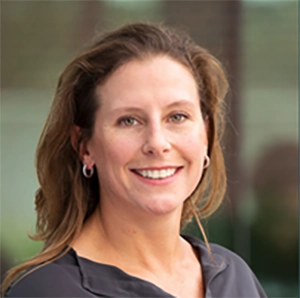
Associate Professor
- dmunroe@hsrl.rutgers.edu
- 6959 Miller Avenue, Port Norris, New Jersey 08349
- https://hsrl.rutgers.edu/
Daphne Munroe
Downloads
Research Interests
Increasing pressures on marine ecosystems, including climate change, resource exploitation, ocean acidification, and pollution threaten to create imbalances that will drive ecological change in the ocean. Sustainability of coastal and marine ecosystems, including both natural and social resilience, relies on understanding, predicting and adapting to these changes. To achieve sustainability we must first understand how ecosystems change: this is the motivation of my research. Larval dispersal dynamics and population connectivity are the primary vehicles for change in marine populations. The ways in which populations are connected determines how populations shift in response to climate or anthropological pressure, how evolution occurs, how effective restoration efforts can be, and how society can sustainably harvest marine resources. In my laboratory, I study these complex interactions using economically and ecologically important coastal invertebrate species.
Short History
I came to Rutgers from colder, more northern climes. The Canadian west coast, where I grew up, is also where I did my undergraduate and graduate training. I was fortunate to be awarded a JSPS postdoctoral fellowship that allowed me to conduct research in Northern Japan.
Teaching Efforts
Undergrad
11:628:125:90 Exploring the World’s Oceans
Byrne Seminar: Oysters Then and Now: Revolutionary Seafood Research at Rutgers
Graduate
co-teaching Ecosystem-Based Fishery Management Seminar
Select Publications
Munroe, D.M., Powell, E.N., Ford, S.E., Hofmann, E.E., Klinck, J.M. 2015. Consequences of asymmetric selection pressure and larval dispersal on the evolution of disease resistance: a metapopulation modeling study with oysters. Mar. Ecol. Prog. Ser. doi:10.3354/meps11349
Narváez, D., D. Munroe, E. Hofmann, J. Klinck, E. Powell, R. Mann, and E. Curchitser. 2015. Long-term dynamics in Atlantic surfclam (Spisula solidissima) populations: The role of bottom water temperature. J. Mar. Sys. 141: 136-148. http://dx.doi:10.1016/j.jmarsys.2014.08.007
Powell, E. N., J. M. Klinck, D. M. Munroe, E. E. Hofmann, P. Moreno, and R. Mann. 2015. The Value of Captains’ Behavioral Choices in the Success of the Surfclam (Spisula solidissima) Fishery on the U.S. Mid-Atlantic Coast: a Model Evaluation. J. Northw. Atl. Fish. Sci., 47: 1–27. http://journal.nafo.int/47/47.html
Zhang, P., Haidvogel, D., Powell, E., Klinck, J., Mann, R., Castruccio, F., Munroe, D. 2015. A coupled physical and biological model of larval connectivity in Atlantic surfclams along the Middle Atlantic Bight. Part I: Model development and description. Estuarine, Coastal and Shelf Sci. 153: 38-53. doi:10.1016/j.ecss.2014.11.033
Munroe, D, J M. Klinck, E E. Hofmann & E N. Powell 2014. A modelling study of the role of marine protected areas in metapopulation genetic connectivity in Delaware Bay oysters. Aquatic Conserv: Mar. Freshw. Ecosyst. 24: 645–666. DOI/10.1002/aqc.2400
Munroe, D., J. Klinck, E. Hofmann, and E.N. Powell. 2013. How do shellfisheries influence genetic connectivity in metapopulations? A modeling study examining the role of lower size limits in oyster fisheries. Canadian Journal of Fisheries and Aquatic Sciences, 70(12): 1813-1828,
Munroe, D.M., E.N. Powell, R. Mann, J.M. Klinck, and E.E. Hofmann. 2013. Underestimation of primary productivity on continental shelves: evidence from maximum size of extant surfclam (Spisula solidissima) populations. Fisheries Oceanography, 22: 220–233. doi: 10.1111/fog.12016.
Munroe, D., A. Tabatabai, I. Burt, D. Bushek, E. N.Powell & J. Wilkin. 2013. Oyster mortality in Delaware Bay: Impacts and recovery from Hurricane Irene and Tropical Storm Lee. Estuarine, Coastal and Shelf Science. 135:209-219. http://dx.doi.org/10.1016/j.ecss.2013.10.011.
Luis Fernando Pareja Roman
Downloads
Research Interests
I am a physical oceanographer with a background in engineering and meteorology. I am interested in coastal ocean dynamics and air-sea interaction (marine meteorology), mainly based on coupled numerical models of weather, ocean circulation, and waves. I enjoy applying fundamental principles of fluid mechanics to address problems that have a strong anthropogenic component such as infrastructure and clean energy development. At RUCOOL, I study the impact of offshore wind farms in the structure of oceanic and atmospheric boundary layers.
Short History
I grew up in the Caribbean, in Cartagena, Colombia, which set me up for a life around the ocean. I received my B.S. in Environmental Engineering at Universidad de los Andes, a M.S. in Marine Meteorology at Universidad Nacional de Colombia, and a Ph.D. in Physical Oceanography at Rutgers University. In between programs, I was a visiting scientist in Geophysical Fluid Dynamics at CICESE, Mexico, and at the Russian State Hydromet University in St. Petersburg, Russia. I worked as a postdoc in Ocean Engineering at Stevens Institute of Technology, and in Ocean Dynamics at Rutgers. I joined RUCOOL in fall 2021.
Select Publications
Pareja-Roman, L. F., Chant, R. J., & Ralston, D. K. (2019). Effects of Locally Generated Wind Waves on the Momentum Budget and Subtidal Exchange in a Coastal Plain Estuary. Journal of Geophysical Research: Oceans, 124(2), 1005-1028. https://doi.org/10.1029/2018JC014585
Pareja-Roman, L. F., Chant, R. J., & Sommerfield, C. K. (2020). Impact of Historical Channel Deepening on Tidal Hydraulics in the Delaware Estuary Journal of Geophysical Research: Oceans, 125(12), e2020JC016256. https://doi.org/https://doi.org/10.1029/2020JC016256
Li, L., Zhu, J., Chant, R. J., Wang, C., & Pareja-Roman, L. F. (2020). Effect of Dikes on Saltwater Intrusion Under Various Wind Conditions in the Changjiang Estuary. Journal of Geophysical Research: Oceans, 125(7), e2019JC015685. https://doi.org/https://doi.org/10.1029/2019JC015685
Li, L., Zhu, J., & Pareja-Roman, L. F. (2021). Calculating salinity variance fluxes using isohaline coordinates. Estuarine, Coastal and Shelf Science, 254, 107311. https://doi.org/https://doi.org/10.1016/j.ecss.2021.107311
Fiorella Prada
Downloads
Research Interests
My research focuses on how marine calcifying organisms, like corals and mollusks, build their biomineralized structures and how this process is influenced by shifting ocean conditions. I study these processes by integrating material science, molecular, and physiological approaches to identify mechanisms underlying coral resilience and persistence in extreme environments (e.g., CO2 vents, deep-sea, upwelling systems).
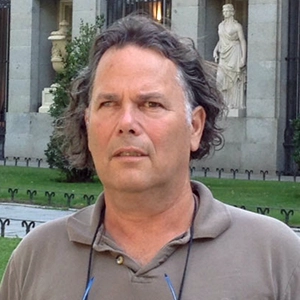
Distinguished Professor | Graduate Program Director
Yair Rosenthal
Downloads
Full CV | Two Page CV | Publications | Google Citations
Research Interests
The overarching motivation for my research is to document past changes in Earth climate change and understand the mechanisms behind them. As the ocean plays a key role in climate, a full understanding of the complexity of past climate change requires thorough knowledge of variations in ocean hydrography (e.g., seawater temperature, salinity and heat content) and circulation through time. Throughout my career, I have endeavored to develop new geochemical proxies that offer quantitative information of past ocean properties to develop the capability for rigorous paleoceanographic reconstructions in a similar manner to that conducted with modern data.
Short History
I was born and grew up in Israel. In 1985 I graduated from the Hebrew University, majoring in geology and biology and later received a M.Sc. degree in geochemistry. During these years I also led adventure tours to Nepal, Kenya, Iceland and Egypt. In 1988 I moved to the U.S. where I received a Ph.D. degree from the MIT/ WHOI Joint Program in Oceanography in 1994 with Prof. Ed Boyle as my principal advisor. As a post-doctoral fellow I worked the Biosphere II Center in Arizona studying the effects of CO2 fertilization on ecosystem photosynthesis. Since 1997 I have been at Rutgers, The University of New Jersey as a faculty in the of Departments of Marine Sciences and Earth and Planetary Sciences.
Teaching Efforts
Chemical Oceanography (Graduate course)
Paleoceanography (Graduate course)
The Water Planet (Undergraduate course)
Grace Saba
Downloads
Full CV | Two Page CV | Saba Research Group
Research Interests
I initiate diverse, multidisciplinary projects in order to address both small-scale (individual organism) and large-scale (whole ecosystem) questions with ecological, physiological, and biogeochemical implications. My broad research interests are in the fields of coastal marine organismal ecology and physiology, with emphasis on how organisms interact with their environment (physical-biological coupling) and other organisms (food web dynamics and predator-prey interactions), how physiological processes impact biogeochemistry (nutrient cycling and carbon sequestration), and how climate change (i.e., ocean acidification, warming) impacts these processes. I apply multiple techniques and collaborate with physical/biological/chemical oceanographers and physiologists, molecular ecologists, fisheries scientists, ocean observers, and climate modelers. I employ an integrative, mechanistic approach and have strong laboratory and field components in my research.
Short History
I received my Bachelor of Science degree in Aquatic Biology in 2002 from the University of California Santa Barbara, then received my Ph.D. in Marine Science in 2010 from the College of William & Mary at the Virginia Institute of Marine Science. I was a post doctoral research associate at Rutgers University from 2010-2012, was promoted to Assistant Research Professor in 2012, and to tenure-track Assistant Professor in 2015.
Teaching Efforts
Fall 11:628:363 OCEANOGRAPHIC METHODS AND DATA ANALYSIS: BIOLOGY/CHEMISTRY (3 cr; Fridays 10:55-5:15)
Prerequisites: 11:628:320; Rutgers REHS Laboratory Safety Training
Description: This course focuses on basic techniques to collect, analyze, and report oceanographic and marine science data with emphasis on biological and chemical variables. This will include interactive lectures, team-based hands-on field sampling, laboratory sample analysis, writing and presenting results, and writing a scientific paper. Teamwork is required for this course. This course will require some travel as well as work outdoors, aboard research vessels, and in the laboratory with chemicals.
Fall 11:628:461/16:712:520 THE BIOLOGY OF LIVING IN THE OCEAN: WATER COLUMN ECOSYSTEMS & PROCESSES (3 cr; Mondays/Thursdays 12:35-1:55)
Prerequisites: 11:628:320, 1 term Calculus, 2 terms General Biology; Recommended: General Chemistry and Physics
Description: The ocean is the majority of Earth and the largest biome on the planet. Processes that occur in the water column are highly dynamic and central to regulating the planet’s biogeochemistry which influences how much oxygen we breath, how many fish exist, and how much oil is available to human’s to extract. This course will cover the processes that regulate the biology of the plankton and fish, which drives the community ecology for ocean ecosystems. This course covers ecological themes such as the acquisition and transformation of energy and materials, population regulation, competition/predation dynamics, population connectivity and marine food webs. The course will also highlight approaches and technologies used to make measurements in the ocean.
Fall/Spring 16:712:605, 606 OCEANOGRAPHY SEMINAR (1 cr; Tuesdays 10:55-12:15)
Prerequisites: 16:712:501, 520 or 522, 540.
Description: Scientific papers are read in order to foster discussion and critical analysis by students of important scientific topics. Papers are selected from all disciplines with an emphasis on interdisciplinary studies, typically with a specific theme each semester. Faculty instructors provide guidance and comment.
Spring 11:628:130 SEA MONSTERS AND WEIRD BIOLOGY IN EARTH’S OCEANS (3 cr; Mondays/Thursdays 12:35-1:55)
Prerequisites: None
Description: We live on an ocean planet. The ocean is full of giant sharks, mythic squids, gargantuan worms, and microbes that shape the planet. Biology is continually adapting and evolving, driven by the environment in which it lives. The ocean encompasses extremes in physical and chemical properties, which have produced weird and unique organisms that live in an environment unlike anything in our human experience. These organisms affect our lives. This class will use the ocean to explore how biology adapts and evolves. We will also explore how the ocean shaped our views of nature, assess how the ocean is changing, and consider how sustainable it will be in the future. Our goal is to increase the biological and ocean literacy of students. The course will be overseen by two faculty, but the course will also include lectures from leading Rutgers scientists who have spent their careers exploring biology in the ocean and will speak on their areas of specialization.
Danielle Santiago Ramos
Downloads
Research Interests
Most broadly, my work has always been guided by a desire to understand the mechanisms behind the persistent habitability that has characterized Earth’s climate for approximately 4 billion years. While it is known that silicate weathering plays an important role in Earth’s long-term climate regulation, some aspects of this feedback are still unclear. For example, to what extent has the alteration of oceanic crust contributed to global silicate weathering rates through time? What is the role of secondary silicate minerals (a product of silicate weathering) in the global carbon cycle? And how have these processes contributed to the observed changes in ocean chemistry over the last ~ 60 million years? To address these and other related questions, I investigate fluid, sediment, and rock archives through a combination of mineralogical data, numerical models, and measurements of stable and radiogenic isotopes. In addition to my core research on the links between global carbon cycle, climate, and ocean chemistry, I am also interested in the application of geochemical tools to environmental science (e.g., the influence of human activities on river chemistry), environmental justice (e.g., fingerprinting sources of contaminants to drinking water), and biology (e.g., osmotic regulation in plant and animal cells).
Short History
I am originally from Recife, a coastal city in the northeast of Brazil with a rich and vibrant culture. Following a short stint as a History major at home, I left Brazil in 2009 to pursue a college degree in Amherst College, MA, where I was exposed to and fell in love with the Earth Sciences. After graduating with a B.A. in Geology in 2013, I joined the Geosciences Ph.D. program at Princeton University under the mentorship of Dr. John Higgins. In 2019, I moved back to MA as a postdoctoral scholar to work with Dr. Sune Nielsen in WHOI’s Geology & Geophysics Department. Before joining the faculty at Rutgers in early 2022, I worked as a Lecturer in the Princeton Geosciences Department in Fall 2021.
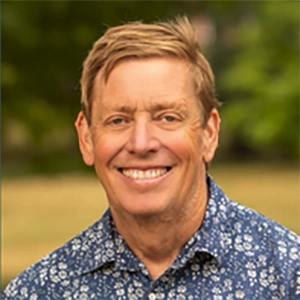
Distinguished Professor and Department Chair | Co-Director of the Center of Ocean Observing Leadership
Oscar Schofield
Downloads
Research Interests
I am a biological oceanographer interested how the physics and chemistry regulates ocean ecosystems, with a primary research focus on the physiology and ecology of phytoplankton. My research is conducted in a range of oceans from the rapidly warming/melting along the West Antarctic Peninsula to sustained studies along the northeast United States. Additionally I am part of the Center of Ocean Observing Leadership (COOL), which is focused on developing new technologies and ocean sensor networks to better document and model the marine system. The COOL group has, and continues, to innovate a range of technologies spanning from remote sensing, radars, and autonomous underwater robotics. Our research efforts are coupled to an extensive public outreach effort focused on communicating the excitement and adventure of conducting science in the field. These outreach efforts have been anchored by extensive web services, teacher training and full length feature movies.
Short History
I grew up swimming, fishing, diving and surfing in Southern California. I decided to pursue a degree in biology and marine science and attended the University of California at Santa Barbara for my undergraduate and PhD where I conducted research on photosynthesis and environmental impacts of the Antarctic ozone hole. I then joined the Agricultural Research Service in New Orleans conducting research in aquaculture and microbial production of off-flavor metabolites before I joined Rutgers in 1995.
Teaching Efforts
Ocean Observatories (a research course focused on student conducting research with live data from the sea, taught both Fall and Spring terms)
Oceanographic Methods and Data Analysis (course focused on the collection and analysis of physical, optical, and biological data in aquatic systems, taught spring term)
Oceanography House (course open to first term freshmen to introduce them to thriving in a research University by exposing them to ocean adventure)
Biological Oceanography: Planktontic Ecosystems (course focused physiology, ecology, and biogeochemistry of planktonic ecosystems and their role in shaping the ecology of the ocean and Earth, this course will be offered in Fall terms)
Foundations of Our Nation: Liberty State Park and the Hudson River Estuary
Corday Selden
DOWNLOADS
RESEARCH INTERESTS
Microbes mediate the flow of energy and matter through the Earth system. In the ocean, diverse microbial communities repartition key elements (and their isotopes) among different chemical phases, altering the fate and fluxes of this material. In so doing, these tiny wonders profoundly influence Earth’s geochemical cycles and climate, shaping planetary habitability.
My research group, the Rutgers Marine Biogeochemistry Lab (RUMBL), investigates feedbacks between ocean chemistry and microbial metabolism that affect Earth system stability. Our work focuses on
(1) how microbes reshape nutrient landscapes in response to (climate-driven) shifts in ocean chemistry/physics (biogeochemical feedbacks), and
(2) how these changes affect distribution of carbon in Earth’s reservoirs (climate feedbacks).
Wedding field-based observations, laboratory experiments, and computational methods, our analytical toolkit includes elemental and stable isotope analyses (nitrogen, carbon, and bioactive transition metals) and ‘omics approaches.
Current projects include:
Does ocean warming reduce iron demand in Southern Ocean phytoplankton? The Southern Ocean is a major sink for atmospheric carbon due to biologically-mediated export (Huang et al. 2023 PNAS). Following observations made on the HMS Discovery in Dec 2023-Jan 2024 (Selden et al., in prep.), this project investigates the hypothesis that, by increasing the efficiency of key iron-containing enzymes (e.g., in photosynthesis and nitrogen acquisition pathways), warming will increase iron use efficiency of iron-limited and cold-adapted phytoplankton, with important consequences for the Southern Ocean biological carbon pump. Preliminary results presented by summer REU students Dylan Buchmiller (TAMU-G) and Karina Lai (UW) at Ocean Sciences Meeting, February 2026.
How will climate-driven shifts in regional circulation alter diffusive mixing and new nitrogen supply/utilization in the tropical Atlantic Ocean? The availability of nitrogen limits ecosystem productivity across vast swaths of the surface ocean, constraining potential carbon export and thus CO2 exchange between the atmosphere and deep sea. In collaboration with Dr. Joe Gradone (Rutgers), this project will investigate: (1) the relationship between basin-scale changes in salinity and the occurrence of salt fingering, a diffusive process which drives water mass mixing more efficiently than mechanical turbulence, (2) the contribution of nitrate fluxes driven by salt fingering to nitrogen supply and “new” primary production, and (3) its impact on upper ocean ecosystem structure. Field campaign supported by grant from the Schmidt Ocean Institute and scheduled for August 2026.
Can new AI tools to predict protein structure from sequence elucidate metal requirements and chemical form in marine phytoplankton? Most metabolic processes are driven by enzymes which contain metal co-factors, meaning that the availability of key metals (e.g., iron, zinc, copper) to a microbial community affects its biogeochemical and ecological function. However, directly assessing metal demand, quotas, and chemical speciation in marine environments is analytically challenging and expensive. In collaboration with Drs. Nathan Yee and John Reinfelder (Rutgers) and Dr. Bhoopesh Mishra (IIT), this project aims to use cutting edge artificial intelligence (AI)-powered tools to predict the occurrence and structure of protein metal-binding sites from ‘omics data, and will test the utility of these tools in phytoplankton cultures against state-of-the-art spectroscopy measurements. Funded by NSF-EAR-GG grant starting September 2025.
I AM CURRENTLY RECRUITING STUDENTS! Please reach out to me by e-mail (crselden@marine.rutgers.edu) if you are interested in discussing opportunities with RUMBL.
Silke Severmann
Downloads
Research Interests
I often describe my research interests as being stuck between a rock and a wet place: My starting point are the sediments at the interface between the water column above and the geological archive below. I want to understand how geochemical proxies are formed and preserved, and how we can read and interpret them – think CSI Terra Oceana. I want to know what goes into the sediments, but also how macro and micronutrients get recycled back into the water column, feeding the surface ocean from deep below. Oxygen is often the gate keeper of these nutrient fluxes in and out of the sediments. Generally speaking, the amount of oxygen present is regulated by biology and by the physical environment, especially temperature. Transition metals and their isotopes are particularly well suited to track changes in the amount of oxygen in the environment because their solubility is a function of ambient oxygen concentrations. Ultimately what I want to know is how changes in the biogeochemical cycling of nutrients and metals are affected by—or have an effect on—the biological evolution and on changes in the physical environment, including the climate.
Short History
I did my undergrad degree in Germany studying Geography, but it was during a year abroad at Edinburgh University that I discovered my love for Geochemistry and Earth Sciences. This experience inspired me to change course and to complete an M.Sc. in Oceanography and eventually a Ph.D. in Geochemistry, both with Rachel Mills at the newly opened Southampton Oceanography Center, UK. From there I moved to the USA, first for a postdoc with Clark Johnson in Madison WI, then another postdoc with Tim Lyons at UC Riverside, before I eventually landed a faculty position at Rutgers.
Teaching Efforts
Undergraduate/Graduate
Introduction to Oceanography (01:460:120:01; 11:628:120:01)
Chemical Oceanography (11:628:472, 16:712:540)
Professional Science Writing and Presentation (16:712:595; 9:15-12:15)
History of Earth Systems (01:460:476:01) – regular guest lectures
Advanced Inorganic Geochemistry (16:712:697; 16:460:621)
Select Publications
Scholz F., Severmann S., McManus J. and Hensen C., Beyond the Black Sea paradigm: The sedimentary fingerprint of an open-marine iron shuttle (2014), Geochim. Cosmochim. Acta. 127, 368-380. http://dx.doi.org/10.1016/j.gca.2013.11.041
Eckert S., Brumsack H.-J., Severmann S., Schnetger B., März C., and Fröllje H. (2013) Establishment of euxinic conditions in the Holocene Black Sea. Geology 41, 431-434. http://dx.doi.org/10.1130/g33826.1
Homoky W.B., Severmann S., McManus J., Berelson W.M., Riedel T.E., Statham P.J., Mills R.A. (2012) Dissolved oxygen and suspended particles regulate the benthic flux of iron from continental margins. Mar. Chem. 134−135, 59-70. http://dx.doi.org/10.1016/j.marchem.2012.03.003
Owens J., Lyons T.W., Li X., Gordon, G., Kuypers M.M.M., Anbar A.D., Kuhnt W., and Severmann S. (2012) Iron isotope and trace metal records of iron cycling in the proto-North Atlantic during the Cenomanian-Turonian oceanic anoxic event (OAE-2), Paleoceanography 27, PA3223, doi:10.1029/2012PA002328.
Severmann S., McManus J., Berelson W.M. and Hammond D.E. (2010) The continental shelf benthic iron flux and its isotope composition. Geochim. Cosmochim. Acta 74, 3984-4004. http://dx.doi.org/10.1016/j.gca.2010.04.022
Severmann S., Johnson C.M., Beard B.L. and McManus J. (2006) The effect of early diagenesis on the Fe isotope compositions of porewaters and authigenic minerals in continental margin sediments. Geochim. Cosmochim. Acta 70, 2006-2022. http://dx.doi.org/10.1016/j.gca.2006.01.007
Lyons T.W. and Severmann S. (2006) A critical look at the iron paleoredox proxies based on new insights from modern euxinic marine basins. Geochim. Cosmochim. Acta. 70, 5698-5722. http://dx.doi.org/10.1016/j.gca.2006.08.021
McManus J., Hammond D.E., Severmann S., Berelson W.M., Holm C., and Klinkhammer G.P. (2006) Molybdenum geochemistry in suboxic continental margin settings: Comparisons and contrasts with uranium. Geochim. Cosmochim. Acta 70, 4643-4662. http://dx.doi.org/10.1016/j.gca.2006.06.1564
Severmann S., Johnson C.M., Beard B.L., German C.R., Edmonds H.N., Chiba H. and Green D.R.H. (2004a) The effect of plume processes on the Fe-isotope composition of hydrothermally derived Fe in the deep ocean as inferred from the Rainbow vent site, Mid-Atlantic Ridge, 36º14’N. Earth Planet. Sci. Let. 225, 63-76. http://dx.doi.org/10.1016/j.epsl.2004.06.001
Rob Sherrell
Downloads
Research Interests
The Sherrell lab studies the biogeochemistry of trace metals in the modern ocean and uses this understanding to develop new geochemical paleo-records of past ocean conditions. We are helping to increase the general knowledge of the distribution and dynamics of trace metals and isotopes in the ocean through the international GEOTRACES program (geotraces.org), and recently completed GEOTRACES cruises in the tropical South Pacific and in the Arctic Ocean. We are very interested in metals that act as micro-nutrients for phytoplankton, and have active research programs exploring the mechanisms of natural Fe fertilization of ocean productivity in two shelf regions off west Antarctica. In addition, we are developing new geochemical paleo-proxies in tropical and deep-sea corals and are using these to develop histories of nutrients and the carbonate system of the past ocean. Part of this work involves long-term culturing studies with slow-growing deep corals to determine coral skeleton chemistry as a function of tightly controlled seawater chemistry; this work is being carried out in Barcelona. We are also pursuing high-resolution paleo-climate results by determining minor elements and isotopes in an 83,000 year old stalagmite from a cave on the SW Pacific island of Niue, with the goal of reconstructing rainfall at this site and unraveling its relationship to polar and global climate variations. Periodically, we make measurements of iridium and other platinum group metals in sediment sections that cross major extinction events in earth’s history, as part of an effort to determine the role of major extraterrestrial impacts. We are very active in developing analytical techniques using plasma source mass spectrometry, which are applied to all of these research endeavors.
Short History
I got my BA in Chemistry at the small land-locked Oberlin College, got my first job in science working on glucose transport in red blood cells, then got a technician position in Oceanography for 2 years, and got admitted to the MIT-WHOI Joint program in Oceanography. After a postdoc working on ice core chemistry in Greenland, I move to a faculty position at Rutgers, where I have been since 1992.
Teaching Efforts
Undergraduate (includes some courses I will teach in the coming year)
Introduction to Oceanography
Exploration of the Oceans
Environmental Geochemistry
Water Planet
Oceanographic Methods and Data Analysis
Graduate
Chemical Oceanography
Seminar in Marine Isotope Geochemistry
The Antarctic: Ocean, Ice, Climate, Biota
Marine Biogeochemistry
Elisabeth Sikes
Downloads
Research Interests
The unifying theme in my work is carbon cycling. As a paleoceanographer, I am investigating circulation in the Southern Ocean to determine how this traps and releases CO2 from the deep ocean on glacial time scales. I also investigate past sea surface temperature changes in the oceans around New Zealand and Australia. On shorter timescales, I am investigating sources, pathways, and sinks of both terrestrial and marine carbon in modern environments with an eye to their interaction with coastal ocean acidification. To do this, I employ isotopic (δ13C, δ18O, and 14C) and organic (biomarker, Uk37) geochemical techniques to answer these questions of sea surface temperature and global circulation change.
Teaching Efforts
Chemical Oceanography
Dynamics of Marine Ecosystems
Oceanography seminar
Earth System Science Coloquium: Global Warming course # 11:015:401:01
Kim Thamatrakoln
Downloads
Research Interests
Trained as a molecular and cell biologist, my research focuses on characterizing the underlying molecular mechanisms that have contributed to the ecological success of phytoplankton. Despite representing <1% of the Earth’s biomass, this microscopic slice of the planet contributes nearly 50% of global primary productivity and plays a role in nearly every major biogeochemical cycle including carbon, nitrogen, and silicon. To understand how these organisms will respond to future predicted changes in the ocean, we need to understand the molecular and biochemical mechanisms that govern their physiological responses. My research combines molecular, biochemical, and biophysical techniques with large scale genomic and transcriptomic studies to answer fundamental questions about the physiology and functional ecology of this globally important group of organisms. Using laboratory model systems of diatoms and coccolithophores, we seek to understand how these organisms respond to environmental stress (e.g. light and nutrient availability, viral infection) and the factors that control their growth and productivity. We then extend these culture-based observations to natural populations on oceanographic research cruises using observational and deck-board manipulative studies.
Short History
I grew up in California and received my B.S. in Biochemistry and Cell Biology from the University of California, San Diego. My first introduction to academic research was as an undergraduate in a Developmental Neurobiology lab at the Salk Institute. After college, I got a job at a biotech company involved in sequencing the first human genome. After 3 months, I realized I preferred the challenge of academic research and the freedom and creativity it allowed. I then got a job as a Research Associate in an Immunology lab at Stanford University where I conducted HIV-related research. I discovered a love for research, but wanted to apply the skills and knowledge I acquired in the biomedical field to an environmentally-related one. After completing a non-thesis driven Master’s in Biology at Stanford’s Hopkins Marine Station, I went on to the PhD program in Marine Biology at the Scripps Institution of Oceanography.
Teaching Efforts
I teach a fully online, asynchronous course call Science, Pseudoscience and Society, which explores how science has influenced society and how we distinguish science from pseudoscience. It debuted in Spring 2020 before the COVID-19 pandemic but couldn’t have been more timely. I have also served as an undergraduate faculty advisor to students enrolled in the G.H. Cook Honors, the Research in Ocean Sciences, and the Aresty Research programs.
Selected Publications
Maniscalco M, MA Brzezinski, RH Lampe, NR Cohen, HM McNair, KA Ellis, M Brown, CP Till, BS Twining, KW Bruland, A Marchetti, and K Thamatrakoln. (2022) “Diminished carbon and nitrate assimilation drive changes in diatom elemental stoichiometry independent of silicification in an iron limited assemblage” ISME Communications https://doi.org/10.1038/s43705-022-00136-1
Locke H, KD Bidle, K Thamatrakoln, CT Johns, JA Bonachela, BD Ferrell, KE Wommack (2022). “Marine viruses and climate change: Virioplankton, the carbon cycle, and our future ocean” in Advances in Virus Research, Ed MJ Roossinck, Academic Press (Cambridge, MA), Vol 114: 67-146 https://doi.org/10.1016/bs.aivir.2022.09.001.
Arsenieff L, K Kimura, CF Kranzler, A-C Baudoux, K Thamatrakoln (2022). “Diatom Viruses” in The Molecular Life of Diatoms, Eds A Falciatore and T Mock, Springer Nature (London, England)
Kranzler CF, MA Brzezinski, NR Cohen, RH Lampe, M Maniscalco*, CP Till, J Mack*, JR Latham*, BS Twining, A Marchetti, and K Thamatrakoln (2021) “Impaired viral infection and reduced mortality of diatoms in iron limited oceanic regions” Nature Geosciences 14:231-237 doi.org/10.1038/s41561-021-00711-6
Berges JA, Young E, K Thamatrakoln, AR Taylor (2021). “From Genes to Ecosystems: using molecular information from diatoms to understand ecological processes” in Advances in Phytoplankton Ecology: applications of emerging technologies, Eds L Clementson, R Eriksen, and A Willis, Elsevier (Amsterdam, Netherlands)
Kranzler C, JW Krause, MA Brzezinski, BR Edwards, WP Biggs*, M Maniscalco*, JP McCrow , BAS Van Mooy, KD Bidle, AE Allen, and K Thamatrakoln (2019) “Silicon limitation facilitates virus infection and mortality of marine diatoms” Nature Microbiology 4:1790–1797
Natalie Umling
Research Interests
The aim of my research is to put modern climate change in the lens of the past by studying recent abrupt climate change and abrupt changes during the transition between glacial and interglacial periods. Specifically, how has ocean circulation and chemistry changed from pre-industrial conditions and during the more rapid climate events that overprint the glacial-interglacial periods of the Pleistocene. By documenting the oceanic changes that have occurred during both modern and past rapid climate events, my research provides clues to the oceanic role in both driving and responding to a changing climate.
Costantino Vetriani
Downloads
Research Interests
Research in my laboratory is focused on the physiology, ecology and evolution of prokaryotes that inhabit geothermal environments. The overarching objective of my research revolves on the question: “how did microbial metabolism evolve?” Anaerobic, thermophilic Bacteria and Archaea that inhabit deep-sea geothermal environments and make a living off volcanic gases carry both ancestral and more recently acquired traits (genes and enzymes) and can be used as models to reconstruct early metabolism. In my laboratory we devote a considerable effort to “domesticate” some of the most fascinating organisms on our planet, and to use them as models to understand the evolution of early metabolism and the adaptations to environments that resemble the early Earth.
Short History
Costa Vetriani is a professor in the Department of Biochemistry and Microbiology and a member of the Institute of Institute of Earth, Ocean and Atmospheric Sciences, and the director of the Microbiology Undergraduate Program at Rutgers University. He began his research activity in a clinical microbiology lab and, as a PhD student, he was trained as a prokaryotic molecular geneticist. Since 1996 Costa Vetriani participated either as research or chief scientist in over 20 oceanographic expeditions in the Pacific and Atlantic Oceans, and in the Mediterranean Sea, and dove in the Deep-Submergence Vehicle Alvin many times. Costa Vetriani is a passionate SCUBA diver and underwater photographer. For more information about Costa Vetriani’s research, visit the Deep-Sea Microbiology Lab website.
Teaching Efforts
Undergraduate
General Microbiology 11:680:390
Seminar in Microbiology 11:680:645
Graduate
Microbial Life 16:682:501
John Wilkin
Downloads
Full CV | Two Page CV | ROMS Community
Research Interests
- High-resolution regional modeling of the coastal ocean for applications related to coupled physical/ecosystem/bio-optical processes, including analysis and evaluation using satellite and in situ observations
- Real-time ocean forecast system development
- Applications of satellite radar altimetry in coastal regions
- Variational methods for assimilating coastal observing system data in models, and observing system design
- High resolution nested modeling of interactions between estuary, shelf sea and deep ocean circulation
- Estuary and coastal ocean carbon and nitrogen cycling
- Coastal ocean air-sea interaction, waves, and sediment transport
Short History
John Wilkin has 25 years of international experience (U.S., Australia and New Zealand) developing and applying model-based analysis systems for interdisciplinary research (nutrient and carbon cycling; larval dispersal; ocean forecasting) in coastal and adjacent shelf and boundary current waters. Most recently, these projects emphasize using variational methods for assimilation of in situ and remotely sensed observations and the design of observing networks. He is a developer of the Regional Ocean Modeling System (ROMS) and co-convenes the annual ROMS User Workshops.
Wilkin is a member of NASA’s Ocean Surface Topography Science Team (OSTST) and is active in promoting uses of radar altimetry in the coastal ocean. He represents OSTST on the Global Ocean Data Assimilation Experiment (GODAE) Science Team (GOVST). Wilkin also co-chairs the User Working Group for NASA’s Physical Oceanography Distributed Active Archive Center (PO-DAAC), and is a member of the Ocean Observing panel for Physics and Climate (OOPC) of the Global Ocean Observing System (GOOS).
Teaching Efforts
Undergraduate/Graduate
Dynamics of Marine Ecosystems
Coastal Ocean Dynamics
Remote Sensing of the Ocean and Atmosphere
Geospatial Data Analysis
Outreach
John Wilkin has lectured in international summer schools in France and Australia that train students and early career scientists on developments in modern coastal ocean observing systems and the interface between observing, modeling and ecosystems. He is a regular member of the Scientific Program Committee of the Coastal Altimetry Workshops that accompany meetings of NASA’s Ocean Surface Topography Science Team, and was chair of the 2015 Gordon Research Conference on Coastal Ocean Modeling. Wilkin has promoted international development and collaboration in applied coastal ocean modeling by co-convening more than 10 Regional Ocean Modeling System (ROMS) User Workshops in the US, Italy, Spain, Australia, France, Brazil and Croatia, and is a regular contributor to the online ROMS User Forum.
Select Publications
Kourafalou, V., P. De Mey, M. Le Hénaff, G. Charria, C. Edwards, R. He, M. Herzfeld, A. Pascual, E. Stanev, J. Tintoré, N. Usui, A. van der Westhuysen, J. Wilkin, X. Zhu, (2015), Coastal Ocean Forecasting: system integration and evaluation, Journal of Operational Oceanography, 8:sup1, s127-s146, doi:10.1080/1755876X.2015.1022336.
Munroe, D., A. Tabatabai, I. Burt, D. Bushek, E.N. Powell and J. Wilkin (2013), Oyster mortality in Delaware Bay: Impacts and recovery from Hurricane Irene and Tropical Storm Lee, Estuarine, Coastal and Shelf Science, 135, 209-219, doi:10.1016/j.ecss.2013.10.011
Wilkin, J., and E. Hunter (2013), An assessment of the skill of real-time models of Middle Atlantic Bight continental shelf circulation, J. Geophy. Res. – Oceans, 118, doi:10.1002/jgrc.20223.
Zavala-Garay, J., J. Wilkin and H. Arango (2012), Predictability of mesoscale variability in the East Australia Current given strong-constraint data assimilation, Journal of Physical Oceanography, 42, 1402-1420, doi:1410.1175/JPO-D-1411-0168.1401.
Hu, J., K. Fennel, J. P. Mattern, and J. Wilkin (2012), Data assimilation with a local Ensemble Kalman Filter applied to a three-dimensional biological model of the Middle Atlantic Bight, Journal of Marine Systems, 94, 145-156, doi: 10.1016/j.jmarsys.2011.11.016.
Wilkin, J., and A. G. Jeffs (2011), Energetics of swimming to shore in the puerulus stage of a spiny lobster: Can a lobster post-larva afford the cost of crossing the continental shelf? Limnology and Oceanography Environment and Fluids, 1, 163-175, doi: 10.1215/21573698-1504363.
Renault, L., G. Vizoso, A. Jansa, J. Wilkin and J. Tintoré (2011), Toward the predictability of meteo-tsunamis in the Balearic Sea using coupled Atmosphere-Ocean Modeling, Geophysical Research Letters, 38, L10601, doi: 10.1029/2011GL047361.
Hofmann, E. E., B. Cahill, K. Fennel, M. Friedrichs, K. Hyde, C. Lee, A. Mannino, R. Najjar, J. O’Reilly, J. Wilkin and J. Xue (2010), Modeling the Dynamics of Continental Shelf Carbon, Annual Review of Marine Science, 3, 93-122, doi: 10.1146/annurev-marine-120709-142740.
Zhang, W., J. Wilkin and J. Levin (2010), Towards an integrated observation and modeling system in the New York Bight using variational methods, Part II: Representer-based observing system design, Ocean Modelling, 35, 134-145, 10.1016/j.ocemod.2010.06.006.
Fennel, K., and J. Wilkin (2009), Quantifying biological carbon export for the northwest North Atlantic continental shelves, Geophysical Research Letters, 36, L18605, doi: 10.1029/2009GL039818
Cahill, B., O. Schofield, R. Chant, J. Wilkin, E. Hunter, S. Glenn, and P. Bissett (2008), Dynamics of turbid buoyant plumes and the feedbacks on near-shore biogeochemistry and physics, Geophysical Research Letters, 35, L10605, doi: 10.1029/2008GL033595.
Javier Zavala-Garay
Downloads
Research Interests
- Predictability of dynamical systems
- High-resolution regional modeling and data assimilation
- Use of variational methods for the study of ocean sensitivity, ensemble prediction, and data assimilation in ocean models.
- Real-time ocean forecasting
- Coupled ocean-atmosphere models
- ENSO prediction and predictability
Short History
I graduated from the University of Colorado at Boulder under the advise of Drs. Andrew M. Moore and Peter Webster, defending the thesis “ENSO Prediction and Predictability”. Since then, I have been mostly interested in understanding why dynamical systems, such as the ocean or the coupled ocean-atmosphere systems, are sometimes more predictable than others. I use numerical models, observations, and the principles of variational calculus to gain a deeper understudying of why this is the case. As a natural extension to this driving question, I also have developed and applied practical methodologies to improve ocean prediction using numerical models and data-assimilation.
Postdocs
Venkatesh Chinni
Short Bio
I am interested in understanding the distribution of trace metals in the ocean in terms of their sources, sinks and internal cycling. Bioavailability of these trace metals (which are micro-nutrients) has a direct impact on primary production, community structure and hence ultimately can regulate the carbon cycle. I am currently involved in the ARTEMIS project under the supervision of Prof. Robert Sherrell at the department of Marine and Coastal Sciences to study the dynamics of trace metals in the Amundsen Sea.
I did my Ph.D. from Physical Research Laboratory (A unit of Department of Space, Government of India) in the field of biogeochemistry. I mainly got fascinated by the concept of “Iron Hypothesis” and the role of trace metals in the ocean and ultimately motivated me to work in the field of trace metal biogeochemistry. Apart from research work, I enjoy playing football, cricket, travelling, and cooking.
Google Scholar link
https://scholar.google.co.in/citations?user=iDIo_DMAAAAJ&hl=en&oi=ao
Jeana Drake
Short Bio:
Youstina Elzahaby
Short Bio:
Dr. Youstina Elzahaby is a recent graduate who has received her PhD in Mathematics with a geophysical fluid dynamics major. Youstina’s research interests are predicting Marine Heatwaves using Machine Learning. While at Rutgers, she will conduct research on elements of the design, development and evaluation of a prototype East Coast Community Ocean Forecast System (ECCOFS) that implements data-assimilation of real-time observations in a Regional Ocean Modeling System (ROMS) model of the western North Atlantic Ocean and U.S. coastal and shelf waters.
Youstina received her PhD in Geophysical Fluid Dynamics at the University of New South Wales, Sydney Australia in 2024
Julia Rieke Hagemann
Short Bio:
Dr. Julia Hagemann is a researcher with a focus on reconstructing Mg/Ca temperature on foraminifera. During the summer of 2019, as a graduate student, Julia participated on the expedition 379T, aboard D/V JOIDES Resolution expedition 379T, as a sedimentologist participant. The primary objective of the expedition was to investigate the link between oceanographic changes at the northern margin of the Antarctic Circumpolar Current and climate variability on the Southern American continent over the past few glacial-interglacial cycles.
During her time at Rutgers, Julia will work on NSF funded project titled, “Long term perspective on the Holocene Co2 Conundrum: the role of Southern Westerly Winds”, where she will focus her research on the core in which she collected at site J1001 to reconstruct the variation of the Patagonian ice sheet on orbital time scales.
Julia received her PhD from the Alfred- Wegener- Institute (AWI) Helmholtz Centre for Polar and Marine Research), Bremerhaven, Germany in 2023.
SK Imadul Islam
Short Bio:
Dr. SK Imadul Islam will be responsible for using existing molecular modeling and simulation tools to engineer protein scaffolds, toward the goal of developing simple, protein-based metallo-catalysts that replicate early life enzymes. Imadul will construct these molecules either by solid-phase peptide synthesis or recombinant expression and reconstitute with appropriate metal cofactors. Imadul will characterize protein structure, metal binding and catalytic activity using established biophysical, spectroscopic and electrochemical tools – EPR, CD, voltammetry.
Imadul received his PhD in Chemistry from S.N. Bose National Centre for Basic Sciences, India, in 2021

Postdoctoral Researcher | Physical Oceanography / Oceanographic Engineering
Frank McQuarrie
Downloads
Short Bio
Dr. Frank McQuarrie is an oceanographic engineer who got his Bachelor’s from Rutgers in 2016. He was deployed to Palmer Station, Antarctica twice with the Schofield lab, spent a few years working at the Catalina Island Marine Institute teaching marine sciences and surfing, then completed a PhD at the University of Georgia. He is excited to be back at Rutgers working with Dr. Travis Miles on the National Academies UGOS project, leveraging glider data to understand currents and ocean movements in the Gulf of America.
Research Interests
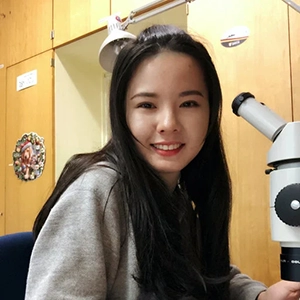
Postdoctoral Researcher | Paleoceanography
- DMCS
Renjie Pei
Short Bio:
Dr. Renjie Pei is a paleoceanographer with a focus on reconstructing past sea surface temperatures (SST) and understanding climatic changes during the late Pleistocene and Holocene periods. Renjie started year 1 of her postdoctoral research at San Diego State University (SDSU) in the Department of Earth and Environmental Sciences with collaborator, Dr. Samantha Bova.
During her 2nd year at Rutgers, she will be responsible for producing records of past sea surface temperatures using geochemical indicators preserved in marine sediments, interpreting these datasets, and communicating results via conference presentations and journal articles.
Renjie received her PhD from Christian-Albrechts-Universität in Kiel, Germany in 2021
Graduate Students in Oceanography
Samantha Alaimo
Downloads
Short History
I grew up on Long Island and spent a lot of my summers in Pennsylvania fishing and exploring. I was always around the water in some capacity and that’s where my interests in marine biology started. I graduated with my BS in Marine Biology (and math minor) from the University of New Haven in 2021. My research there was focused on the spatial distributions and habitats of four flatfish species in the Long Island Sound and the characteristic polynomials of symmetric matrices. I also studied Sustainable Fisheries at the Shoals Marine Laboratory on Appledore Island, ME. Outside of work, you can probably find me fishing, swimming, skiing, kayaking, at the beach, or taking pictures.
Research Interests
Broadly, I am interested in how the physical features of the ocean affect commercially important fish populations. The fishing industry not only provides food to the world, but also contributes a lot to the economy. How will changes in the oceans affect them? More specifically, I am interested in how offshore wind development off the coast of NJ is going to affect fish populations. As an avid fisher, I am interested in how offshore wind is going to affect the fisheries.
Education
2021-Present, Ph.D. Student, Oceanography, Rutgers University
2021, B.S. Marine Biology, University of New Haven
Alexandria Ambrose
Short History
I was born and raised in Detroit, MI, where my interest in science was sparked. My interest in marine systems did not evolve until I started my undergraduate degree. I received my B.S. in Marine Sciences from Savannah State University in 2019. After graduating I started as a lab tech at the Haskin Shellfish Research Laboratory for a year. There I mostly worked on the ecology of oyster at different life stages, using multiple techniques. I am starting as a master’s student in the graduate program of oceanography in 2021
Research Interests
On a broader scope, I am interested in how organisms are using available resources in changing habitats and how these changes can impact an ecosystem. I am also interested in studying how non-aquaculture species interact with sustainable aquaculture practices. My research will focus on the habitat enhancement of hard clams to improve larval recruitment. This work will also include the preservation of clam farms from cownose ray predation in Great Bay. In New Jersey, the hard clam aquaculture industry has decreased in recent years due to multiple factors including, cownose ray predation and limited leasing sites. There is the potential for new leases to be permitted but in deeper waters, but they would be more difficult to maintain. Determining habitat enhancement methods that are low maintenance for the farmer and prevent cownose ray predation could be beneficial to the farmer and the overall clam aquaculture industry in New Jersey.
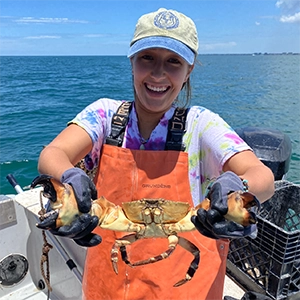
Graduate Student
- HSRL
Talia Barry
Short Bio
Growing up exploring the marshes and tide pools in Long Island Sound fostered my passion for the ocean. After getting a taste of research in high school I was hooked on science. I pursued my BS at the University of Tampa with a double major in marine science and biology. During my undergraduate education I studied the impacts of the stone crab fishery practices on the intraspecific interactions of stone crabs. In 2022, I was an NSF REU at the Bermuda Institute of Ocean Sciences studying coral thermal resilience. My research interests are mollusks and crustaceans. In my free time I like to hike, go to the beach, and go scuba diving.
Cody Benton
Downloads
Research Interests
I am from Wilmington, North Carolina and studied physics at UNC Wilmington. After graduating I worked as a research assistant at the Center for Marine Science where I helped process and distribute data collected by an array of moorings on the NC shelf. I used the data to investigate the ocean’s physical response to tropical and extra tropical storms, as well as establish climatological trends in the coastal ocean. My research interest going forward is in the physical processes that govern coastal and estuarine systems. These regions are of particular interest to me because of the impact they have on society. Since most of society resides near a coast, it is important that we understand the physical processes and how human activity may impact them.
Short History
I grew up in Wilmington, North Carolina, with the ocean at my doorstep. I have always enjoyed being outdoors and having a good adventure. This led me to six summers as an ocean lifeguard and hobbies such as surfing, hiking, and camping. On the other hand, I have always been curious in asking “why” and “how” things work. This curiosity led me to a degree in physics at UNC Wilmington. While studying at UNC Wilmington I was fortunate enough to discover the perfect intersection of my interests, physical oceanography.
Kayla Cayemitte
Short Bio
My undergraduate education is from Ursinus College where I received a B.S. in Biology with minors in studio art and scientific ethics. My fascination and love of coral science began here, working in a lab where we investigated a combination of anthropogenic stressors on the coral Astrangia poculata. I continued my education over the summer of my junior year at Woods Hole Oceanographic Institution where we examined the effects of an invasive encrusting algae on coral larvae settlement. I joined Dr. Prada’s lab as a lab assistant and will be starting my Ph.D. under her advisement. I plan to focus on the effect of anthropogenic stressors on coral reefs in refugia systems. My area of study is Biological Oceanography, Coral Science. My hobbies include cuba diving, photography, hiking, travel, cooking/baking (I am a huge foodie and love to try new foods)
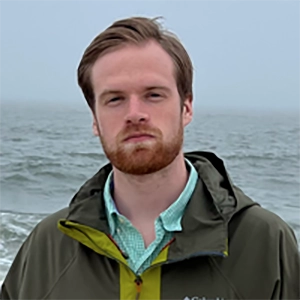
Graduate Student
- HSRL
Paul Coyne
Research
I am a Graduate Assistant under Ximing Guo at the Haskin Shellfish Research Laboratories. The research project I am currently assisting with involves assessing what genetic markers are linked to QPX-disease resistance, fitness, and growth in hard clams. This involves following the survivability of these clams from larvae to market size over the course of multiple years.
Short History
Though born with plenty of access to the coastal waters of New Jersey, my appreciation for aquaculture began only in high school. My senior year, I researched, proposed, and constructed an aquaponic system of tilapia and native plant species, which still produces for my high school today. In college, I continued to explore aquaculture by working as a water quality technician at a local zoo, allowing me to work with various species of fish. I have now begun work with shellfish aquaculture in Cape May at the Cape Shore Laboratory. Here, I happily work with various shellfish species such as oysters, scallops, and hard clams.
Education
Present: Masters Student in Oceanography, Rutgers University
2021, B.S., Marine Science / Animal Science, Rutgers University
2019, A.S., Biology, County College of Morris
David Davis
Short History
My name is David Davis. I was born in Keflavik, Iceland, and raised in Merced, California. I graduated from Georgia State University this spring with a B.S. in geology. While at GSU I was part of a research group that has been participating in the Hominin Sites and Paleolakes Drilling Project (HSPDP). My work focused on trying to identify the links between climate and tectonic changes and how they may have influenced human evolution by analyzing the clays and zeolites from paleolake beds in the East African Rift Valley. During the 2017 and 2018 summers I worked at WHOI, analyzing vanadium isotopes in Martian achondrites and carbonaceous chondrites and eucrites from 4 Vesta. The purpose of this research was to characterize the irradiation history of the early solar system, but also to investigate the production of vanadium in our solar system and to understand how the Earth formed.
Research Interest
I am now an incoming PhD student and I’ll be working with Yair. For now, my project will be studying the Earth’s marine and atmospheric iodine cycle. I am curious to know if I can use oceanographic methods and the stable isotopes of iodine to elucidate whether Earth’s marine-atmospheric iodine cycle is a detectable biosignature and if it is, can I use that data to assess the habitability of other planets and ocean worlds such as Europa, Enceladus, and maybe Mars.
Rachel Davitt
Short Bio
I grew up in Randolph, New Jersey, and have been in love with the ocean for as long as I can remember! This led me to majoring in marine biology at the University of Delaware, where I graduated with my B.Sc. in 2023. While there, I interned with the Rutgers RIOS program, working under Dr. Kimberlee Thamatrakoln to study the effect of silicon limitation on host-virus dynamics in the diatom Chaetoceros socialis. Since graduating, I have worked as a seasonal marine field worker at the Rutgers Haskin Shellfish Research Laboratory under Dr. Daphne Munroe, and I am super happy to be back at Rutgers! Broadly, my research interests include understanding phytoplankton-environment interactions, how these interactions will change due to climate change, and the role of marine viruses in these relationships. I am also super passionate about scientific communication and outreach. Outside of work, I enjoy traveling, spending time outdoors, and trying new foods.
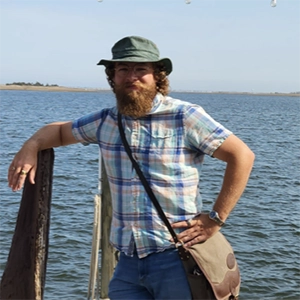
Graduate Student
- DMCS
Sean Devine
Short Bio
I grew up in Chatham, NJ where I fostered a love of the ocean through beach trips and reading. I received my B.S. in marine science and biology from the University of Miami in 2017, where I interned for larval ecology and oil drift prediction labs. After four years in the USMC followed by two years working as a fisheries observer in the NE region, I’m currently pursuing a master’s with a focus on biological and ecological modeling. Of the many diversions I enjoy, some include kayaking, string bass, swimming, poetry, and sketching.
Quintin Diou-Cass
Research Interests
I am currently interested in determining the primary factors mediating phytoplankton community dynamics in the western Antarctic Peninsula (WAP) with Oscar Schofield. I am particularly interested in how abiotic elements, such as light, dictate phytoplankton community diversity. I am looking to utilize metagenomic and metatranscriptomic methods to determine diversity and functional responses (respectively) in the Antarctic phytoplankton on a relatively finer scale than previous research. I am aiming to apply the results of my research, in combination with historical data, to extrapolate future long-term changes in the ecological and biogeochemical states of the WAP ecosystem under the context of a changing climate.
Short History
I grew up in south central Maine where as a kid I was often off exploring the woods, taking plaster molds of bird footprints, catching small fish and frogs in nets, or recording observations of animals in my small notebook. Although I only spent an average of a few days a year near the ocean on family camping trips in Acadia National Park or summer excursions to the beach, I became captivated by the ocean at a young age and have pursued learning about it ever since. I got my undergraduate degree in Ecology at Susquehanna University in central Pennsylvania, during which I spent half of my summers as part of the university’s Freshwater Research Initiative studying stream ecology. The rest of the time I spent down in Savannah Georgia at the Skidaway Institute of Oceanography, where I aided in examining coastal estuarine phytoplankton dynamics and phytoplankton-bacteria chemical interactions. I am driven by a desire to explore, and I ultimately hope to expand our understanding of the ocean in a way that is both impactful and engaging.
Education
2018, B.S. Ecology, Susquehanna University
2019-Present, PhD Student, Graduate Program in Oceanography, Rutgers University
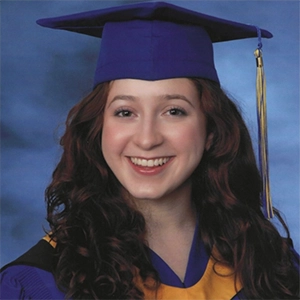
Graduate Student
- DMCS
Maya Feinstein
Short bio:
I am from Haddonfield, NJ. In high school, I played varsity lacrosse and soccer. I graduated from the University of Delaware with an Honors B.S. in Environmental Science as a Climate Scholar. My interest in Oceanography began sophomore year after learning about its connection with the climate system in an Introduction to Ocean Sciences class. My Senior Thesis was titled Vertical Motions in the Southern Ocean. I completed a summer project on this topic under Dr. Xinfeng Liang at the Lewes, DE marine campus. At Rutgers, I am advised by Dr. Javier Zavala- Garay in the Ocean Modeling Group. I am interested in the coupled ocean-atmosphere system, especially regarding vertical mixing, extreme events and the global overturning circulation.
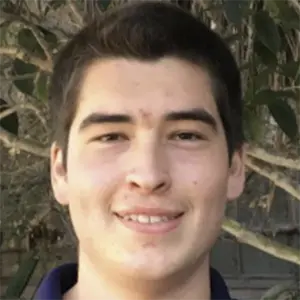
Graduate Student
- DMCS
Logan Gonzalez
Short History
A fascination with the origin of life led me to pursue a degree in biochemistry at the University of California, Santa Barbara (UCSB), where I got interested in marine microbes after taking a microbiome seminar. I did most of my undergraduate research in Holly Moeller’s lab using laboratory experiments and mathematical modeling to study the effects of climate change on the evolution of mixotrophic phytoplankton that are capable of predation in addition to photosynthesis. After graduating, I worked as a researcher at the Cold Regions Research and Engineering Laboratory, a part of the US Army Corps of Engineers, focusing mainly on biotechnological applications of cold-adapted microorganisms.
Research Interests
I am broadly interested in studying the interplay between microbial interactions and biogeochemical cycling in the past, present, and future. I’m particularly excited about marine virology as there are currently major gaps in our understanding of how viruses influence biogeochemistry. My research at Rutgers will help to address some of these gaps by focusing on the effects of viral infection on marine phytoplankton including the coccolithophore Emiliania huxleyi, a major player in ocean carbon export.
Education
2023-present, PhD Student, Biological Oceanography, Rutgers University
2020, B.S. Biochemistry, University of California, Santa Barbara
Ashley Hann
Research Interests
Short History
Leah Hopson
Downloads
Short History
While growing up in New York, specifically in the lower Hudson Valley region, I was able to explore many aspects of our environment. My interests in the environment grew from taking a high school earth science course to which I learned about tropical cyclones and thus, I developed a strong curiosity in extreme weather events. This led me to go on to study environmental changes and earn my B.S. in Atmospheric and Oceanic science from the University of Maryland. During my undergrad, I was able to participate in different research experiences, and over time, these experiences carved out my path in physical oceanography to understand air-sea interactions.
Research Interests
My last research experience during my undergrad solidified my interests in oceanography even further. This project, through Texas A&M University, focused on the relationship between ocean heat content and tropical cyclone induced rainfall in the Gulf of Mexico. With my atmospheric science research experiences and my oceanography related experience, I developed an interest in studying the dynamics of the ocean and atmosphere and understanding the intensification of tropical cyclones over time. I hope to gain many skills from the different areas of oceanography to continue studying extreme weather with my advisor Dr. Travis Miles during my time as a PhD student.
Education
2021, B.S. Atmospheric and Oceanic Science, The University of Maryland
2022-Present, PhD Student, Graduate Program in Oceanography, Rutgers University
Becca Horwitz
Short History:
I grew up in Brooklyn, New York, and had the East River estuary system as my backyard which has inspired both my career path and my research interests. I attended Carleton College for my undergraduate education where I received a double Bachelor of Arts degree in Geology and Environmental Studies in 2022. I participated in a Marine Science NSF-REU at Rutgers in 2021 between my junior and senior years of college. My work during my REU exploring fundamental shelf processes in the Mid-Atlantic set the stage for my current research. After graduating from Carleton, I worked for the Rutgers University Haskin Shellfish Research Laboratory where I learned about fisheries science and the shellfish industry. Long story short, I fell in love with Rutgers and I never left! Outside of work, you can find me rock climbing, sitting in my hammock, playing with my cat Trudie or training for a triathlon.
Research Interests:
I am interested in the overlap between physical and biological oceanography although I approach my research from a physical perspective. I strive to connect my research with the broader communities impacted by my science. Specifically, my thesis work focuses on using observational data to understand the frequency and drivers of marine extreme temperature events in the Mid-Atlantic.
Alice Jenks
Short Bio:
I grew up on the Long Island Sound, where I discovered my love for the ocean. I attended Farmingdale State College for my undergraduate studies where I majored in Bioscience and received a minor in Chemistry. As an undergraduate, I studied the filtering capabilities of marine sponges in relation to wastewater introduced by terrestrial run off. In addition to this, I performed pathogen screenings on farmed sugar kelp. Through previous studies, I gained a broad interest in using molecular techniques to study microbial ecology in the ocean. As a graduate student, my goal is to use molecular techniques to delineate the mechanism of coccolith shedding in Emiliania huxleyi and determine which proteins/lipids are involved in that process.
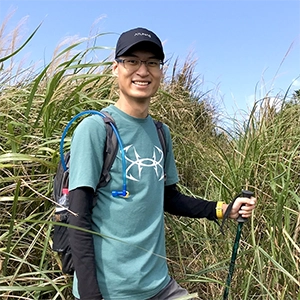
Graduate Student
- DMCS
Bor-jiun Jong
Short history
Growing up in Taiwan, where is constantly stricken by tropical cyclones, floods, and earthquakes, I have been interested in Earth Sciences since I was a kid. I am especially eager to find out the causes and mechanisms of the climate system and its impact on human society, so I majored in Geosciences for my undergraduate. Later, I studied paleoceanography with a focus on the Barium cycle in the Arctic Ocean for my master thesis. I analyzed the Ba/Ca ratios in planktic foraminifera to understand the driving factors of the Barium cycle in the Arctic Ocean throughout the last glacial period. When I am not in the lab, I love spending my time hiking, cycling, and swimming. I also enjoy reading books and watching Netflix in a cozy room when the weather is unforgiving.
Research interests
I am interested in reconstructing the history and mechanisms of the climate and ocean systems using geological records. I am particularly intrigued by the verification of paleo proxies through comparing them to modern records, and subsequently, improving our ability to reconstruct the past climate. By studying the past climate, I aim to better predict the possible future scenarios in a warmer climate.
For my PhD, I will focus on the climate impact of reverse weathering and apply isotopic analysis to marine sediment, comparing the modern and paleo records. The goal is to estimate the CO2 emission rate and scale of reverse weathering in the ocean and its significance to the climate system.
Education
2018, B.S., Geosciences, National Taiwan University, Taiwan
2021, M.S., Geosciences, National Taiwan University, Taiwan
2023 – present, Ph.D. Student, Graduate Program in Oceanography, Rutgers University
Jessey Kreinik
Short History
I am currently a student in the Graduate Program in Oceanography at Rutgers University. Broadly, I am interested in phytoplankton ecology, ranging from interspecific interaction to impacts on biogeochemical processes. Specifically, I will be working with Kay Bidle (Oceanography) and Juan Bonachela (Ecology and Evolution) to study viral infection of the coccolithophore Emiliania huxleyi and modelling how host physiology impacts characteristics of viral infection. During my undergraduate career, I worked with the dinoflagellate, Noctiluca scintillans, at Lamont Doherty Earth Observatory under Joaquim Goes, studying the impact of ocean acidification and hypoxia on growth, grazing, and symbiosis. I graduated from Skidmore College with a B.A. in Biology in 2021 and minored in geosciences. My love for understanding how abiotic processes influenced biology led me to the interdisciplinary world of Oceanography.
Education
2021, BS, Biology, Skidmore College
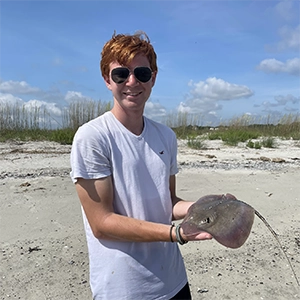
Graduate Student
- DMCS
Jake Kuenzli
Short Bio:
Research Interests:
Isabella Moore
Short Bio
Growing up along the Delaware Bay, I quickly developed a passion for the ocean. I spent my childhood flipping over
horseshoe crabs and learning to surf. For the past five summers, I worked for the Cape May Beach Patrol, which has been a very rewarding experience. I received my Bachelor’s degree in Marine Science from Stockton University. This year, I completed my Master’s in Marine Science with a concentration in Physical Oceanography at the University of South Carolina. I am excited to explore my research interests here at Rutgers! Pictured is my dog Zee, a rescue from Kosovo.
Nicole Nikolova
Short Bio:
Hi, I’m Nicole, but more often than not, I go by Nikki! I grew up within arm’s reach of the Atlantic Ocean, along the New Jersey coast, or as many like to refer to it, the Jersey Shore (i.e. the heart of reality TV). Frequent visits to the beach fostered my idea that watching the ocean felt akin to observing magic, I ended up here at DMCS, studying physical oceanography for my undergraduate degree.
My undergraduate time at Rutgers, working with DMCS faculty, revealed the inherent curiosity that drives the field of oceanography. So, while the spells and scrolls I saw in video games and files couldn’t feasibly be studied, I found ocean modeling to be a vessel for that same excitement and curiosity – one that I will now get to explore alongside my advisors John Wilkin and Javier Zavala-Garay for my Master’s degree. I will focus on using ocean modeling, coupled with observations, to reveal large-scale ocean dynamics, specificially in the Indonesian Throughflow and its surrounding regions, to investigate water mass transformations. My work blends numerical model analysis, mathematics, physics, and in-situ observational data to investigate marine dynamical processes. Furthermore, I hope to expand my research methods by utilizing new approaches that emerge as the field continues to evolve, and to extend my work into other areas, such as ocean forecasting.
While I love all things ocean-related, I’m also an enthusiast for pop culture, color coordination, and documentaries. I love seasonality, cats, when the name of an album is dropped in a song, and… is this where I say, long walks on the beach?
Benson Ossai
Research interests
I find physical oceanography fascinating because of its diverse and interdisciplinary topics such as the impact of ocean temperature variations on fisheries, sea level rise, sea surface winds and waves, ocean surface currents, sea ice, etc. I seek to understand the interactions between Estuary and Coastal systems. In particular, I am interested in how tidally forced saltwater intrusion in Estuaries during extreme droughts could impact the quality of drinking water. I hope to use a combination of field, lab, and numerical methods in investigating the physical dynamics of Estuary and Coastal systems. I am also interested in how freshwater coming from high-latitude -Arctic and Greenland Ice Sheets could be affecting the North Atlantic circulation and how this would impact our climate.
Short history
I grew up in a coastal community in the Niger Delta region of Nigeria where I often go fishing. In my early years, I always wonder how and what makes vessels float on water without sinking. This curiosity led me to study marine engineering at undergraduate level. After my final undergraduate exams, I continued working at the Center for Maritime and Offshore Studies, Federal University of Petroleum Resources Effurun as a research assistant where I got involved in research that deals with studying the ocean to bridge the gap between marine sciences and engineering. When I am out of work, I enjoy playing soccer, traveling, and camping.
Education
2019, B.Eng., Marine Engineering, Federal University of Petroleum Resources Effurun, Nigeria.
2023 – Present, PhD Student, Graduate Program in Oceanography, Rutgers University.
Bridget Ovall
Short History
I earned a B.S. in Oceanography at the University of Washington, where I first developed a fascination with the Arctic region, its unique place in the global climate system, and the complex ways in which local inhabitants are tied to the environment. After graduation, I spent a year working as a research assistant at WHOI studying the roles of sea ice and wind on circulation in the Chukchi Sea. Here at Rutgers, I am working with Rebecca Jackson, studying the role of marine-terminating glaciers on fjord circulation. The results of the interplay between glaciers and fjord waters have implications for both the ice sheets and the open ocean.
Trivik Ragha
Downloads
Education:
Mya Sharpe
Downloads
Short Bio
As a child, I didn’t have many waterways near my home growing up in Brooklyn, New York. During summertime, I would take the train to Coney Island beach for about an hour. My days there were spent searching the shoreline for washed up sea creatures. As discoveries grew, my interest peaked. A few feet from the shoreline, I dug a hole in the sand and filled it with seawater to create a makeshift touch pool. Then, unknowingly, I took my first steps towards my future career, by observing their anatomy and admiring their textures.
Research Interest
In our current era of rapid global warming, the polar regions are experiencing the most significant impact, leading to the retreat of perennial glaciers. This, in turn, affects phytoplankton blooms and community composition in coastal waters. My current research interests revolve around exploring phytoplankton ecology in the West Antarctic Peninsula (WAP). Specifically, I am focused on understanding glacial retreat dynamics, the trace metal composition of glacial meltwater, and how the availability of metals influences phytoplankton communities. This, in turn, plays a key role in shaping the biogeochemistry of nonmetals like carbon and nitrogen. A subtopic area of interest is the effects of copper (Cu) in low iron conditions, particularly in the context of glacial melt into coastal waters. Additionally, I aim to examine phytoplankton variations in fluorescence under iron-limited conditions.

Graduate Student
- DMCS
Suman Shekhar
Downloads
Short History
Having been born in a family of Indian Air Force personnel, I spent my entire childhood growing up on Air Force campuses. My father worked in the Meteorology Department, which gave me the privilege to see the functioning of the department. I used to visit his office; the idea of predicting the weather pattern by solving a coupled partial differential equation sparked my interest in learning Fluid Mechanics. But after joining the Indian School of Mines, I got an amazing opportunity to study a bit about earth sciences. It actually gave me the motivation to learn about the earth’s climate. However, my obsession with Fluid dynamics turned my path toward Oceanography. That was the way I could pursue climate science and fluid dynamics simultaneously. We know the ocean has an enormous role on the earth’s climate, and we still don’t know many physical processes governing these changes.
In my day-to-day research life, I spend doing lots of maths and coding. I use numerical modeling to study and model the physics behind the physical processes and am also an enthusiast of high-performance computing, which enables me to model much more refined scales. My undergraduate work was on modeling LES simulation of Polynya convection in the Weddell Sea, investigating the role of double-diffusion on polynya formation.
I will be joining Rutgers University this Fall and working with Professor John Wilkin.
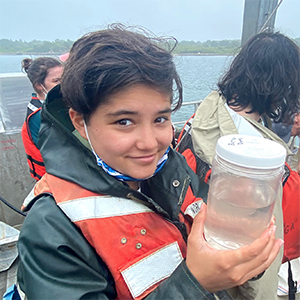
Graduate Student
- HSSRL
Hails Tanaka
Downloads
Short History
I was raised in Mississippi where I spent many summers going down to the Gulf and becoming fascinated with the ocean. As I moved into my undergraduate degree, I wanted to learn about as many aspects of the ocean as I could. In 2022, I earned my B.S. in Marine Biology from the College of Charleston in South Carolina. I will continue my education in the graduate Oceanography program at Rutgers starting in 2022 with Dr. Daphne Munroe.
Research Interests
My research interests include larval ecology, bio-physical interactions, and the impacts of climate change on invertebrate communities and populations.

Graduate Student
- DMCS
Jolie Tosten
Short Bio:
Although I grew up in Idaho, a landlocked state, my close proximity to many rivers led to my interest in aquatic ecosystems. In high school, my interests in aquatic ecosystems turned into a passion, and I decided early on that marine biology is what I wanted to pursue. I attended the University of Hawai’i at Mānoa to achieve this dream. My interest in microbial marine biology was fueled by a marine ecology class that I took my second year of college. That following summer I was lucky enough to be an intern at Mote Marine laboratory where I researched a mitigation technique of the dinoflagellate that is responsible for causing the Florida Red Tide. I have also worked with marine microbial fungi and most recently zooplankton, specifically how deep sea mining may impact these organisms. I am deeply interested in phytoplankton and how viruses, biogeochemical cycles, and climate change can impact these organisms. In my free time I enjoy being outdoors, especially hiking, going to the beach, and playing tennis.
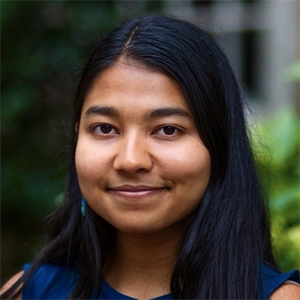
Graduate Student
- DMCS
Bhavyaa Tyagi
Short Bio:
I’m fascinated by the tiny dramas playing out in the ocean—where microbes interact and set the stage for processes like chemotaxis. My curiosity dives deep into how these unseen interactions shape marine ecosystems and influence the overall health of our oceans.
Qibin Xu
Short History
I have a broad interest in studying the past, present, and future of the ocean and its role in the global element flux as well as energy equilibrium. Based on the fact that multiple proxies in marine sediments can effectively reflect changes in the physicochemical state of seawater during historical periods. Combining our understanding of ocean processes (physical, chemical and biological). Predictions can be made about the role of the ocean in the context of future climate change. The future of the ocean will also become clear with the change of time.
Education
2013, B.S. Geology, Lanzhou University
2017, M.S. University of Science and Technology of China
(2017-2018, Geochemistry; 2018-2021 Environmental Science)
Research Staff
David Aragon
Research Interests
I have been helping RUCOOL with its research for over 10 years as the primary underwater glider pilot and technician. Initially I was involved with HF-Radar experimental antennas, maintenance of existing radar sites, and led new CODAR installations along Long Island and New Jersey. My educational background is in Electrical Engineering where I focused on robotics and computer graphics. Conducting research for RUCOOL has been rewarding, invigorating, and eye opening and looking to help it continue to grow and lead ocean observation across the globe.
Hernan Arango
Downloads:
Short Bio:
Hernan has been a Physical Oceanographer and Ocean Modeler at Rutgers University since September 1995. He is the lead developer of the Regional Ocean Modeling System (ROMS) and its ROMS-JEDI interface, part of the Joint Effort for Data Assimilation Integration (JEDI) Framework. This framework was created by colleagues at the Joint Center for Satellite Data Assimilation (JCSDA) in Boulder, Colorado. Over the years, ROMS has become more sophisticated and advanced, thanks to the contributions of various interdisciplinary scientific colleagues. ROMS is a community model in every sense, and its software is freely available at www.github.com/myroms. It has nearly 8,000 subscribed users worldwide, representing 120 countries.
I am fortunate to have a job that I truly love. I am curious, patient, and determined to develop and code complex physical and mathematical numerical models. I have also been privileged to work alongside extraordinary and talented colleagues I respect and admire. I strive to carry on the legacy of my early mentors, who inspired me during my graduate studies at Texas A&M University. From a young age, I have been drawn to both the ocean and computers, and it continues to amaze me that my passion for these interests remains as strong as ever.
In my free time, I enjoy astronomy, photography, traveling, admiring our planet, cooking, tasting fine wines, and reading a variety of genres
Lisa Auermuller
Downloads:
Bio:
Lisa Auermuller serves as the Administrative Director of Rutgers’ NSF-funded Megalopolitan Coastal Transformation Hub (MACH). In this role, Lisa is the central manager of overall operations of the multi-institution effort. Lisa establishes mechanisms for collaborative sharing of findings among project partners, conducts regular outreach to promote coordination and collaboration with government agencies, and community leaders, and facilitates meaningful and routine collaboration and sharing among project partners.
Prior to 2023, Lisa was the Assistant Manager of the Jacques Cousteau National Estuarine Research Reserve (JC NERR) in Tuckerton, NJ where she had been employed since 2002. Lisa oversaw the day-to-day management of JC NERR’s Coastal Center as well as the Reserve’s education, outreach, communications, and Coastal Training Program.
Beatrice Birrer

Graduate Student Master of Operational Oceanography | Laboratory Researcher
Brian Buckingham
Kaycee Coleman
Research Interests
My current research interests focus on offshore wind farms, fish, fishing communities, and using Slocum gliders to study the ocean. My educational background is in Biological Oceanography. For an up to date CV please visit ResearchGate.
Michael Crowley
Downloads
Research Interests
Michael is the Technical Director for the Rutgers University Center for Ocean Observing Leadership (RUCOOL) and the Mid-Atlantic Regional Association Coastal Ocean Observing System (MARACOOS). His RUCOOL work includes: management of operations the entire COOL Lab, ensuring continuous quality data delivery from RUCOOL, and heading up the external communications for the RUCOOL Team including oversight of our website.
Michael is also the Technical Director for the U.S. Integrated Ocean Observing System (IOOS) MARACOOS. Michael oversees all aspects of data collection within the Mid-Atlantic Bight (Cape Hatteras to Cape Cod). MARACOOS collects data primarily from satellites, HF-RADAR and underwater ocean gliders. Data from all the instrumentation is used to feed and test ocean forecast models, with the ultimate goal being to better enable scientists to forecast both the ocean and atmospheric weather for the greater good of the Mid-Atlantic region. All of the data and much more can be viewed at oceansmap.maracoos.org.
Short History
1991 B.A. Geography, Rutgers University, New Brunswick, New Jersey.
1993 M.S. Geography/Oceanography, Rutgers University, New Brunswick New Jersey.
Julia Engdahl
Short History
I was part of the first cohort for the Master’s in Operational Oceanography at Rutgers University. During my time as a student, I became proficient in programming languages such as Python, MATLAB, and R in addition to the computer vision software, OpenCV, and machine learning algorithm, YOLOV3. I have used my coding expertise to analyze large physical oceanographic datasets. In June of 2020, I was hired as a federal contractor to support NOAA/NOS/CO-OPS to perform routine QA/QC procedures on water level and current meter data, generate historical high tide flooding statistics, and produce the annual high tide flooding outlook. My expertise in programming allowed me to innovate process automation, data visualizations, and to become a certified Software Carpentries Data Carpentries Instructor. All of which has led me back to Rutgers University – Center for Ocean Observing Leadership (RUCOOL) as a Laboratory Researcher where I will be working on the development of onboard processing capabilities for ocean gliders, including the processing of integrated current profiler data to deliver real time velocity measurements to shore. This effort will enable future use of real-time velocity profile data for use in oceanographic numerical modeling data assimilation and model evaluation, as well as making remote measurements of ocean currents and transport.
Lori Garzio
Downloads
Research Interests
I am the Laboratory Manager for the Saba Laboratory, which is part of the Center for Ocean Observing Leadership (COOL). My broad research interests include the long-term impacts of climate change on marine ecosystems and the ocean’s role in the global carbon cycle, particularly at high latitudes. I am specifically interested in the biological component of the carbon cycle, such as the spatial and temporal variability of primary production, how primary productivity is influenced by top-down and bottom-up processes, and the role of zooplankton in biogeochemical cycling and sequestration of carbon. In addition to my biological oceanography research interests, I also enjoy developing software programs (using Python) for data maintenance and quality control.
Short History
I received my M.S. in Marine Science in 2012 from the College of William & Mary at the Virginia Institute of Marine Science. For my thesis research, I investigated the microzooplankton community structure and grazing impact along the Western Antarctic Peninsula as part of the Palmer Antarctica Long-Term Ecological Research (PAL LTER) project. I went on to work as a data analyst in the pharmaceutical industry for several years where I gained experience in database management and data visualization before returning to my passion for oceanography research as part of the Center for Ocean Observing Leadership (COOL). From 2015 – 2018, I was part of the Data Evaluation team at Rutgers for the Ocean Observatories Initiative (OOI) where we assisted with the testing, deployment, and maintenance of the OOI Cyberinfrastructure system for data delivery to public users. I am now involved in various projects for the COOL group, including data analysis and visualization for wind energy assessment projects; real-time and delayed-mode glider data processing, QA/QC, analysis and visualization; and field and laboratory work for zooplankton ecology projects.
Select Publications
Steinberg DK, Ruck KE, Gleiber MR, Garzio LM, Cope JS, Bernard KS, Stammerjohn SE, Schofield OM, Quetin LB, Ross RM. 2015. Long-term (1993 – 2013) changes in macrozooplankton off the Western Antarctic Peninsula. Deep-Sea Research Part I 101:54-70.
Garzio LM, Steinberg DK, Erickson M, and HW Ducklow. 2013. Microzooplankton grazing along the Western Antarctic Peninsula. Aquatic Microbial Ecology 70:215-232.
Garzio LM, and DK Steinberg. 2013. Microzooplankton community structure along the Western Antarctic Peninsula. Deep-Sea Research Part I 77:36-49.
Sailley SF, Ducklow HW, Moeller HV, Fraser W, Schofield OM, Steinberg DK, Garzio LM, and SC Doney. 2013. Carbon fluxes and pelagic ecosystem dynamics near two western Antarctic Peninsula Adélie penguin colonies: an inverse model approach. Marine Ecology Progress Series, 492: 253-272.
Chip Haldeman
Research Interests
The physical aspects tend to pique my interest the most – waves, currents, tides, and the motion of the ocean. Specific interests include the physical coupling of the ocean and atmosphere, and the effects that the ocean has on weather. I’ve spent a large part of my career collecting and analyzing glider data in an attempt to provide more data for models to assimilate, hoping to significantly improve forecasting. I do, however, find smaller scale phenomena just as interesting – a tidal jet approaching an ideal laminar flow showing up in the ADCP data we’re collecting will have me as excited as a kid in a candy store.
Short History
Whether it’s work or play, the ocean is my forte. Growing up in NJ I spent a lot of time on the ocean, but going to school in New Mexico, I had a very limited view of what oceanography actually was. Attending Rutgers broadened my horizons significantly, and I joined COOL as an undergrad. Bringing with me a significant set of hands-on skills and seamanship, I filled a specific niche and was able to forge a path all my own that has blossomed into an incredible career. From building and designing moored instrumentation arrays, to CODAR technician, to glider pilot and technician, to scientific research diver, and now research vessel captain, it has all been very fulfilling. I am a Rutgers “lifer”, and I now enjoy imparting that knowledge to the next crop of scientists and technicians that come through RUCOOL.
Ethan Handel
Downloads
Research Interests
I am a research project coordinator with RUCOOL, and I primarily specialize in operational oceanography. Specifically, I have been working to support NOAA’s IOOS program as the lead HF-radar operator for the Mid-Atlantic region. I am responsible for the installations, operations, maintenance, and enhancement of 20 different coastal research stations. My time is divided between working on science and engineering data analysis, collection, and aggregation, from RUCOOL’s operations center at Rutgers University and conducting fieldwork at the shore. I help assist faculty, post-docs, grad students, and undergrads who need to work with the data collected by our HF-radar systems. This data is used to make near-real-time maps of the coastal ocean surface currents, which gets used to help improve the U.S Coast Guard’s Search and Rescue operations.
Short History
I graduated from Rutgers University in 2008 with a degree in Applied Ecology and Natural Resources Management. Having spent time as an undergraduate assisting the RUCOOL group in a variety of roles, I began working full-time with RUCOOL after completing my Bachelors program.
Eli Hunter
Research Interests
- Coastal and estuarine physical processes.
- Modeling of coastal ocean dynamics.
- Real-time data assimilation for ocean forecasting.
- Small scale turbulence measurements in the field and laboratory
- Lagrangian measurements and processes.
Short History
I earned a degree in Physics from Rensselaer Polytechnic Institute in 1992, after which I spent 5 years as a quality control chemist in the electronics gas industry. In the Fall of 1999, I returned to school at the College of Marine Studies at the University of Delaware. In the Spring of 2001, I was awarded an M.S. in Physical Ocean Science and engineering and was brought on at Rutgers University as a technician.
John Kerfoot
Sage Lichtenwalner
Short History
Sage works with scientists to translate their research results and data into online and offline products that can be used by K-16 students, teachers and the general public. Sage is a research programmer who concentrates on product management, design, and database driven web development. He has over a decade of experience designing and developing interactive web applications and data visualization tools that communicate cutting edge research in accessible ways. Sage has a B.S. in Physics from Rutgers University and a M.B.S. in User Experience Design.
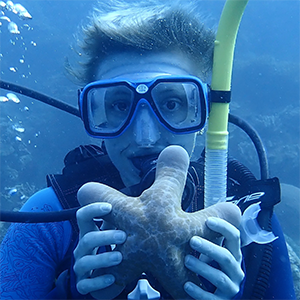
Research Program Coordinator
- DMCS
Delphine Mossman
Downloads
Research Interests
My research interests are multidisciplinary and manyfold. With the work I am doing with RUCOOL, I am interested in the effectiveness of glider-mounted echosounders as a supplement or even a replacement to conventional vessel-based zooplankton sampling, and anthropogenic impact on the ocean. I am also interested in cetacean communication and conservation, and the impact of noise pollution on ocean ecosystems.
Short History
I have harbored an intense love of and fascination with the ocean for as long as I can remember, fueled mainly by summer camps and trips to the shores of Stone Harbor, NJ. To that end, I attended Stony Brook University on Long Island for my undergraduate years and received bachelor’s degrees in Marine Vertebrate Biology and Applied Math & Statistics. Just prior to graduating, I exchanged emails with Dr. Kim Davies of the University of New Brunswick, and we agreed that her research on a glider-mounted echosounder was the perfect fit for my graduate-level research interests. I received with my MSc in Biology in August of 2022, and am now working full-time for Rutgers University on glider-echosounder evaluation projects.
Laura Nazzaro
Downloads
Research Interests
I am a research programmer involved in various projects for the COOL lab. My main focus lies in how features of the physical environment relate to biological patterns and trends, both on short and long time scales. Many of my projects use remotely sensed data and modeled projections to better understand patterns in mid-Atlantic fisheries indices, and some of these results have been included in stock assessments for certain species. I also contribute software and analysis of remotely sensed data from gliders, HF radar, and satellites to other projects involving storm forecasting, seabreeze and offshore wind energy, creation of climatologies, and quality control of data.
Short History
In 2008 I graduated from The College of New Jersey with a degree in biology focused in ecology, and began working towards a masters degree at Rutgers. My thesis aimed to identify how various physical features of the environment, such as temperature and surface currents, correlate with fish abundance and distribution patterns in the Mid-Atlantic Bight. I have continued working on various projects within the COOL lab since graduating in early 2011.
Hugh Roarty
Downloads
Research Interests
Hugh Roarty is an award winning speaker and recipient of the John P. Breslin Award for outstanding research in ocean engineering. He is currently a Research Project Manager with the Center for Ocean Observing Leadership at Rutgers University. His research interests focus on improving the remote sensing and in situ instrumentation used to measure the physical and biological aspects of the ocean. This instrumentation includes High Frequency (HF) radar systems, autonomous under water vehicles (AUVs), and acoustic velocity meters. He has used HF radar systems for the measurement of ocean surface currents and wave parameters. He has applied these measurements for use in Coast Guard search and rescue exercises, the study of river discharge plumes and prediction of coastal inundation during storm events. He also developed the dual use capability of the HF radar for environmental monitoring and target detection. This work was performed within the National Center for Secure and Resilient Maritime Commerce (CSR). His graduate research focused on coastal processes and bottom boundary layer dynamics.
Short History
2001 Ph.D. Ocean Engineering, Stevens Institute of Technology, Hoboken, New Jersey, USA
1998 M.S. Ocean Engineering, Stevens Institute of Technology, Hoboken, New Jersey, USA
1995 B.S. Civil Engineering, Rutgers College of Engineering, New Brunswick, New Jersey, USA
David Robertson
Mike Smith
Downloads
Research Interests
Mike is a graduate of Rutgers University in 2009 with a BS in Biological Sciences. He has worked full-time as a research analyst in the Center for Ocean Observing Leadership (COOL) since 2009 and has experience on a variety of projects utilizing most of the oceanographic sensors operated by the lab. One of his primary focus over the past eight years has been quality control (QC) and visualization of the data products derived from CODAR SeaSonde High Frequency (HF) radar. He has been maintaining the real-time data processing of HF radar radial data into surface current vectors for the Mid-Atlantic, Antarctic, and Puerto Rico regions. He has also developed a python toolbox that reads in HF Radar files, runs a variety of QC tests, and outputs the data into multiple formats: MySQL, NetCDF, and LLUV format. Additionally, he was also heavily involved in the development of an algorithm that utilizes HF radar data to detect ships beyond the horizon. Over the past four years, Mike has been assessing the quality of mobile and stationary assets for the Endurance Array of NSF funded Ocean Observatories Initiative (OOI) project nearly full-time.
Timothy Stolarz
Understanding Ocean Highways: Trends in Surface Current Divergence in Urbanized Coastal Margins for a Predictable Ocean
Mitaali Taskar
Short Bio:
Born and raised in New Jersey, I have always been interested in fostering the curiosity all of us possess; I work with various communities to create and maintain meaningful science outreach and education networks.
I earned a B.Sc. Biology from McGill University, devoting much of my time with local science outreach initiatives and organizations. It was there that I planned on studying how informal science outreach works with formal science education to impact how every person perceives and values the scientific field.
Then, I served as a Public Ally through an Americorps Service Project, working as an alternative science educator in Colorado. Developing my own curricula through a historically responsive lens, I emphasized critical thinking and asking weird questions earnestly.
After this, I gained a M.S.Com. (Master of Science Communication) from Laurentian University. Connected with a leading science center, I examined how we can systematically evaluate the meaningful impacts of science outreach efforts.
After all this travel, I am thankful to return home, eager to apply my work at Rutgers University.
Nicole Waite
Downloads
Research Interests
Broadly, I am interested in coastal marine ecosystems, with a particular interest in how the chemistry and biology of these environments are interrelated. A main driver of my research interests is how humans are connected to, impact, and depend on the oceans. I am interested in research that focuses for example on climate change, ecosystem health of important resources, and eutrophication. Currently, my research focuses on phytoplankton ecology along the Western Antarctic Peninsula, one of the most rapidly warming places on Earth. I am also a part of the Center of Ocean Observing Leadership (COOL), where I help deploy our fleet of gliders (autonomous underwater vehicles). Outside of research, I’m also very interested in education and outreach. I think it is so important to involve non-scientists in the work we do to not only share why it is important and matters to them but to get them interested and excited about the oceans in general. Whenever I can, I love to help out our outreach team when opportunities arise.
Short History
I’ve always loved the ocean and have been studying oceanography since high school, where I competed in the National Ocean Sciences Bowl. I received my Bachelor’s degree from the University of New England, with a major in Marine Biology and a minor in Chemistry. After that, I spent a year working in a marine benthic ecology lab at the Dauphin Island Sea Lab, Alabama with Dr. Ken Heck. My research there focused on near-shore oyster reefs and seagrasses. I completed my Master’s degree in Oceanography at Rutgers with Dr. Silke Severmann. My thesis research focused on how sedimentary sulfide and iron is impacted by eutrophication and how that in turn affects seagrass health. Upon completion of my Master’s degree, I remained working in coastal ecosystems, but I made a big jump from the coasts of New Jersey to the coasts of Antarctica and began working as a Lab Researcher for Dr. Oscar Schofield and the COOL group.

